#us america middle of the east coast
Text
being an american on here is wild because i keep seeing posts from other americans that describe things they've experienced and say that it is universal among americans and it'll be stuff i've either never heard of or know for a fact isn't true. maybe it's pretty common in your state or the states surrounding you, but there's so much stuff i see that i can not relate to whatsoever, and i've never left the states.
#liv won't shut up#i saw something about insurance today#said that optometry is never covered by health insurance#& i'm sitting here like dude the insurance my dad gets from work benefits (so it's not the best in a lot of ways) has covered our optometry#costs for 3 people for years. & actually idk the specifics but it seems like its not that bad of a plan. we usually buy more than a years#supply of contacts for me (only like a month more) and our insurance covers pretty much all the costs. i have to choose contacts or glasses#every year but my prescription has been very stable so i only have to get new glasses if they're damaged beyond repair#again it's not my insurance i'm covered by my parents & they dont tell me all the details so idk how much theyre paying for it. might be a#lot & we're doing it bc it's one of my dads benefits. but any way the point is that so many americans will say things like every single#person living in america understands & 90% of the time i have no frickin clue what they're on about or i have experienced the exact opposit#it's just interesting that this happens. & it happens all the time. 'all american schools require learning another language' no the frick#they do not. lots do (and this may be a state requirement thing wouldnt be surprised) but not all. wasnt required for me it was just highly#encouraged & i got a different type of diploma for my world lang classes (my hs had a few types of diplomas based on different classes/#grades/etc idk if thats a common thing or not). another good example are train posts actually. i can tell theres a divide between beliefs#on trains based on state & thats bc public transportation is not as feasible in some states. i've spent a good portion of my life living in#small towns or visiting small towns (family) & yeah public transportation in middle of nowhere wyoming and middle of nowhere idaho is a lot#less feasible than the east coast. those are places of vast nothingness other than a few towns every once in a while never exceeding 20000#(ID) or 500 (WY). & even in larger towns it seems like a lot of western states are more spread out. so a subway or other train isnt very#helpful (unless you want to do long distance trains then those could maybe work the issue is that costs money & idk if itd be used enough#to make it worth it for a gov/actually work well) & this is more of a rural/urban issue but that aligns with states as well in a lot of way#oh another one is about facs classes. so in a lot of places facs is being defunded or removed from curriculum. same with arts classes. &#this is becoming a problem in many places! but when ppl are like 'these classes are being taken away everywhere in america' i just sit#there thinking about my state requiring facs in middlie & high school (i believe but things could have changed) plus i had to take like 3#semesters of art (idk if thats state or school or district required) & thereve been talks of raising that requirement. & they add more opt#every year. i was helping my younger brother with his schedule & theres all sorts of stuff that wasnt there before. he has way more options#to fulfill that requirement than i did. & i'm not saying that this isnt a problem it is a problem most places but every state has different#legislation on this so for now at least lots of schools are required to have these classes. & i've probably lost my point by now but it is#odd that i see this so often. that most of posts about america i see are different from what i've experienced. idk maybe the states i've#lived in are weird but youd think that this wouldnt happen to me a lot would you? like sometimes yeah but this happens a lot.#my guess is that a lot of these things are very true if you talk about a specific region or state. but then ppl assume its an american
2 notes
·
View notes
Text
I don’t usually talk about politics on here, if ever. But it’s been almost six months since the conflict in the Middle East flared up again, and I’m finally ready to start. Here are some of my thoughts.
I say ‘flared up’ because this has happened before and it’ll happen again. Because, even though what's currently going on is absolutely unprecedented, those of us who live in this part of the world are used to it. Let that sink in: we are used to this. And we shouldn’t have to be.
But I use that term for another reason: I don't want to accidentally call it the wrong thing lest I come under fire for being a genocidal maniac or a terrorist or a propaganda machine, etc., etc.—so let’s just call it ‘the war’ or ‘the conflict.’ Because that’s what it is. Doesn’t matter which side you’re on, who you love, or who you hate.
This post will, in all likelihood, sit in my drafts forever. If it does get posted, it certainly won’t be on my main, because I'm scared of being harassed (spoiler: she posted it on her main). I hate admitting that, but honestly? I’m fucking terrified.
I also feel like in order for anything I say on here (i.e. the hellscape of the internet) to be taken seriously, I have to somehow prove that a) I’m “educated” enough to talk about the conflict, and b) that my opinion lines up with what has been deemed the correct one. So, tedious and unnecessary though it is, I will tell you about my experience, because I have a feeling most of the people reading this post are not nearly as close to what’s happening as I am.
How do I explain where I live without actually explaining where I live? How do I say “I live in the Red Zone of international conflicts” without saying what I actually think? How do I convey the fear that grips me when I try to decide between saying “I live in Palestine” and “I live in Israel”? I don't really know. But I do know that names are important. I also know that, due to the various clickbaity monikers ascribed to the conflict, it would probably just be easier to point to a map.
I haven't always lived in the Middle East. I've lived in various places along America’s east coast, and traveled all over the world. But in short, I now live somewhere inside the crudely-drawn purple circle.
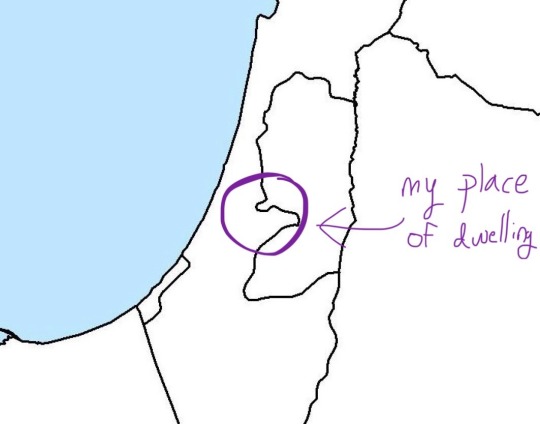
If you know anything about these borders you probably blanched a bit in sympathy, or maybe condolence. But in truth, it’s a shockingly normal existence. I don't feel like I've lived through the shifting of international relations or a war or anything. I just kind of feel like I did when COVID hit, that dull sameness as I wondered if this would be the only world-altering event to shape my life, or if there would be more.
I've been told that, in order for my brain to process all the horrific details of the past six months, there needs to be some element of cognitive dissonance—that falling into a sort of dissociative mindset is the only way to not go insane under the weight of it all. I think in some ways that’s true. I have been terrifyingly close to bus stop shootings when my commute wasn’t over; I have felt my apartment building shake with the reverberations of a missile strike; I have spent hours in underground shelters waiting for air raid sirens to stop.
But. I have also gone grocery shopping, and skipped class, and stayed up too late watching TV, and fed the cats on the street corner, and cried over a boy, and got myself AirPods just because, and taken out the trash, and done laundry on a delicate cycle, and bought overpriced lattes one too many days a week. I have looked at pretty things and taken out my phone because, despite it all, I still think that life is too short not to freeze the small moments.
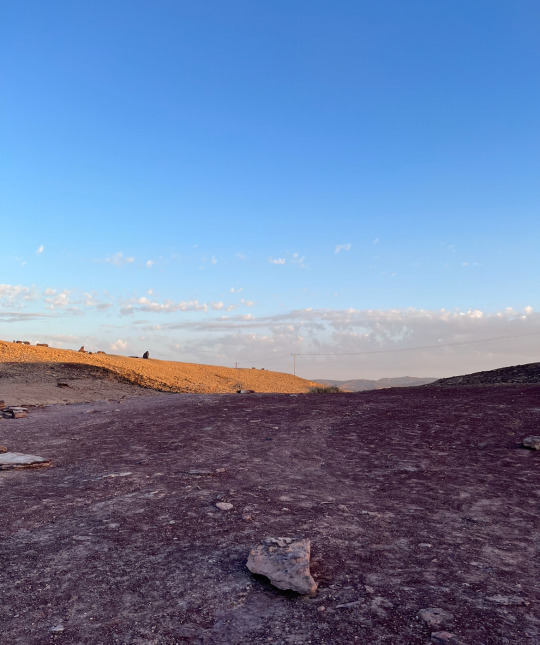
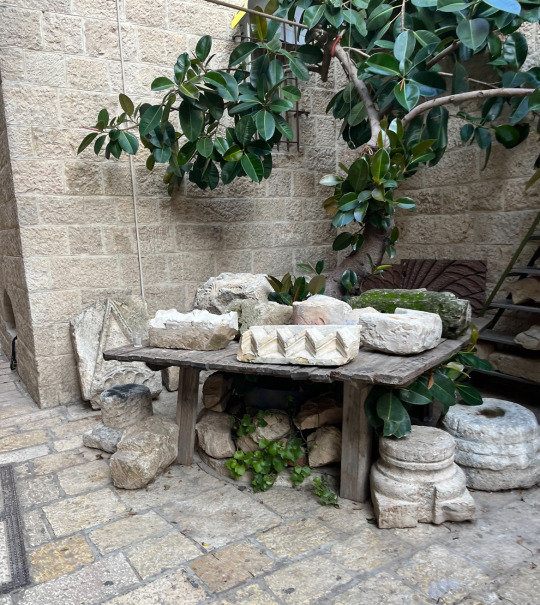
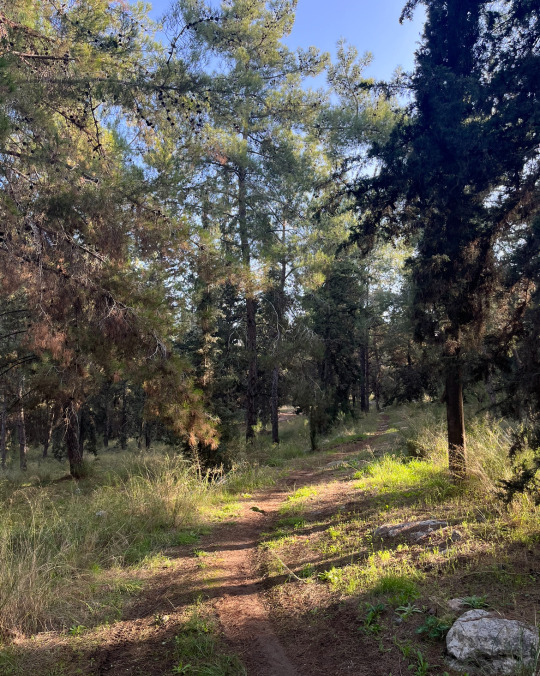


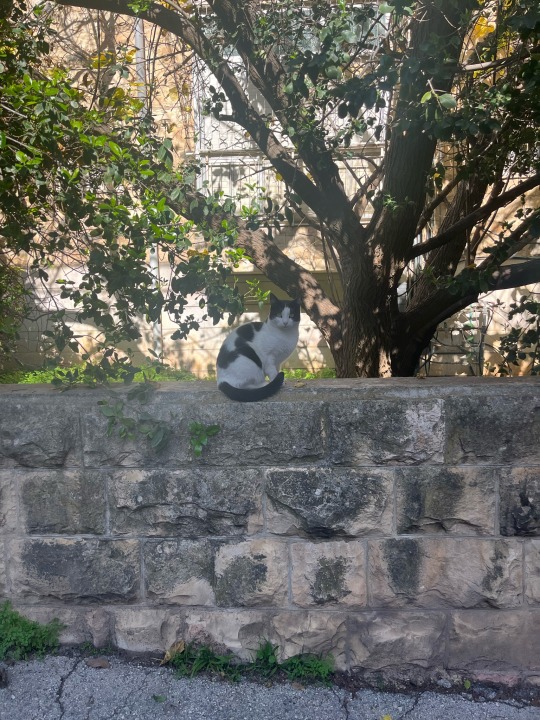
So I'd say, all things considered, I live an incredibly privileged life—compared, of course, to those suffering in Gaza—one filled with sunsets and over-sweetened knafeh and every different color of sand. One that allows me to throw myself into a fandom-induced hyperfixation (or, alternatively, escape method) as I sit on the couch and crack open my laptop to write the next chapter of the fic I'm working on.
But there are bits of not-normalness that wheedle their way through the cracks. I pretend these moments are avoidable, even if they’re not.
They look like this: reading the news and seeing another idiotic, careless choice on Netanyahu’s part and groaning into my morning coffee. Watching Palestinian and Jewish children’s needless suffering posted on Instagram reels and feeling helpless. Opening my Tumblr DMs to find a message telling me to exterminate myself for reblogging a post that only seems like it’s about the war if you squint and tilt your head sideways.
These moments look like all the tiny ways I am reminded that I'm living in a post-October seventh world, where hearing a car backfire makes me jump out of my skin and the sound of a suitcase on pavement makes me look up at the sky and search for the war planes. They look like the heavy grief that is, and also isn’t, mine.
Here's the thing, though. I know you’re wondering when the ball will drop and my true opinion will be revealed. I know you’re waiting for me to reveal what demographic I'm a part of so that you, dear reader, can neatly slap a label on my head and sort me into some oversimplified category that lets you continue to think you understand this war.
No one wants to sit and ruminate on the difficult questions, the ones that make you wonder if maybe you’ve been tinkered with by the propaganda machine, if you might need to go back on what you’ve said or change your mind. We all strive for our perception of complicated issues to be a comfortable one.
But I know that no matter what I do, there will always be assumptions. So, while I shudder to reveal this information online, I think that maybe my most significant contribution to this meta-discussion spanning every facet of the internet is this:
I am a Jew.
Or, alternatively, I am: Jewish, יהודית, يَهُودِيٌّ, etc. Point is, I come from Jews. And, like any given person, I am a product of generation after generation of love.
I'm not going to take time to explain my heritage to you, or to prove that before all the expulsions and pogroms, there was an origin point. If you don’t believe that, perhaps it’s less of a factual problem and more of an ‘I don’t give weight to the beliefs of indigenous people’ problem. But, in case you want to spend time uselessly refuting this tiny point in a larger argument, you can inspect the photos below (it’s just a small chunk of my DNA test results). Alternatively, you can remember that interrogating someone in an attempt to make their indigeneity match your arbitrary criteria is generally not seen as good manners.
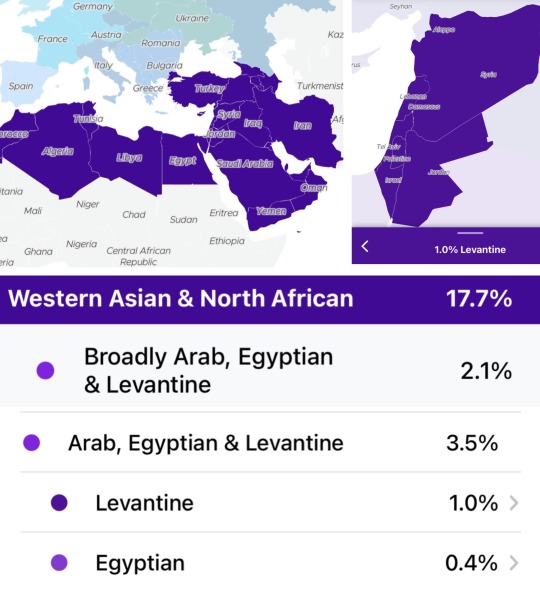
Now, let’s go back to thathateful message (read: poorly disguised death threat) I received in my Tumblr DMs. I think it was like two or three weeks ago. I had recently gained a new follower whose blog’s primary focus was the fandom I contribute to, so I followed them back. I saw in my notes that they were going through my posts and liking them—as one does when gaining a new mutual. Yippee!
Then they sent me this:
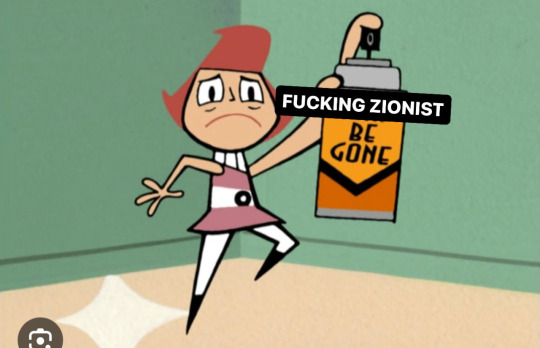
I tried to explain that hate speech is not a way to go about participating in political discourse, but the person had already blocked me immediately after sending that message. Then, assured by the fact that I surely would never see them complaining about me on their blog (because, as I said, they blocked me), they posted a shouting rant accusing me of sympathizing with colonizing settlers and declaring me a “racist Zionist fuck.” Oh, the wonders of incognito tabs.
Where this person drew these conclusions after reading my (reblogged) post about antisemitism…. I'm not actually sure. But I greatly sympathize with them, and hope that they weren’t too personally offended by my desire to not die.
For a while I contemplated this experience in my righteous anger, and tried to figure out a way to message this person. I wanted to explain that a) seeing a post about being Jewish and choosing to harass the creator about Israel is literally the definition of antisemitism and b) that sending a hateful DM and refusing to be held accountable is just childish and immature. But I gave up soon after—because, honestly, I knew it wasn’t worth my effort or energy. And I knew that I wouldn't be able to change their mind.
But I still remember staring at that rather unfortunate meme, accompanied by an all-caps message demanding for me to Free Palestine, and thinking: the post didn’t even have any buzzwords. I remember the swoop of dread and guilt and fear. I remember wondering why this kind of antisemitism felt worse, in that moment, than the kind that leaves bodies in its wake.
I remember thinking, I don’t have the power to free anyone.
I remember thinking, I’m so fucking tired.
And before you tell me that this conflict isn’t about religion—let me ask you some questions. Why is it that Israel is even called Israel? (Here’s why.) Why do Jews even want it? (Here’s why.) But also, if you actually read the charters of Islamist terrorist organizations like ISIS, Hamas, and Hezbollah (among others), they equate the modern state of Israel with the Jewish people, and they use the two entities interchangeably. So of course this conflict is religious. It’s never been anything but that.
But I do wonder, when faced with those who deny this fact: how do I prove, through an endless slew of what-about-isms and victim blaming, that I too am hurting? How do I show that empathy is dialectical, that I can care deeply for Palestinians and Gazans while also grieving my own people?
There's this thing that humans do, when we’re frustrated about politics and need to howl our opinions about it into the void until we feel better. We find like-minded souls, usually our friends and neighbors, and fret about the state of the world to each other until we’ve gone around in a satisfactory amount of circles. But these conversations never truly accomplish anything. They’re just a substitute, a stand-in catharsis, for what we really wish we could do: find someone who embodies the spirit of every Jew-hating internet troll, every ignorant justifier of terrorism, and scream ourselves hoarse at them until we change their mind.
But, of course, minds cannot be changed when they are determined to live in a state of irrational dislike. In Judaism, this way of thinking has a name: שנאת חינם (sinat hinam), or baseless hatred. It's a parasite with no definite cure, and it makes people bend over backwards to justify things like the massacre on October seventh, simply because the blame always needs to be placed on the Jews.
So when a Jew is faced with this unsolvable problem, there is only one response to be had, only one feeling to be felt: anger. And we are angry. Carrying around rage with nowhere to put it is exhausting. It's like a weight at the base of our neck that pushes down on our spine, bending it until we will inevitably snap under the pressure. I’m still waiting to break, even now.
I wish I could explain to someone who needs to hear it that terrorism against Israelis happens every single day here, and that we are never more than one degree of separation away from the brutal slaughter of a friend, lover, parent, sibling. I wish it would be enough to say that the majority of Israelis (which includes Arab-Israeli citizens who have the exact same rights as Jewish-Israelis) wish for peace every day without ever having seen what it looks like.
I wish I could show the world that Israel was founded as a socialist state, that it was built on communal values and born from a cluster of kibbutzim (small farming communities based on collective responsibility), and that what it is now isn’t what its people stand for.
I wish the world could open their eyes to what we Israelis have seen since the beginning: that Hamas is the enemy, Hamas is the one starving Palestinians and denying them aid, Hamas is the one who keeps rejecting ceasefire terms and denying their citizens basic human rights. Hamas is the governing body of Gaza, not Israel. Hamas is responsible for the wellbeing of the Palestinian people. And Hamas are the ones who are more determined to murder Jews—over and over and over again, in the most animalistic ways possible—than to look inwards and see the suffering they’ve inflicted on their own people. I wish it was easier to see that.
But the wishing, the asking how can people be so blind, is never enough. I can never just say, I promise I don't want war.
When I bear witness to this baseless hatred, I think of the victims of October seventh. I think of the women and girls who were raped and then murdered, forever unable to tell their stories. I think of the hostages, trapped underneath Gaza in dark tunnels, wondering if anyone will come for them. I think of Ori Ansbacher, of Ezra Schwartz, of Eyal, Gilad, and Naftali, of Lucy, Rina, and Maia Dee, of the Paley boys, of Ari Fuld and of Nachshon Wachsman. I think of all the innocent blood spilled because of terror-fueled hatred and the virus of antisemitism. I think of all the thousands of people who were brutally murdered in Israel, Jews and Muslims and Christians and humans, who will never see peace.
My ties to this land are knotted a thousand times over. Even when I leave, a part of me is left behind, waiting for me to claim it when I return. But when I see the grit it takes to live through this pain, when I see the suffering that paints the world the color of blood, I look to the heavens and I wonder why.
I ask God: is it worth all this? He doesn't answer. So I am the one, in the end, to answer my own question. I say, it has to be.
Feel free to send any genuine, respectful, and clarifying questions you may have to my inbox!
EDIT: just coming on here to say that I'm really touched & grateful for the love on this post. When I wrote it, I felt hopeless; I logged off of Tumblr for Shabbat, dreading the moment I would turn off my phone to find more hate in my inbox. Granted, I did find some, and responding to it was exhausting, but it wasn’t all hate. I read every kind reblog and comment, and the love was so much louder. Thank you, thank you, thank you. 🤍
Source Reading
The Whispered in Gaza Project by The Center for Peace Communications
Why Jews Cannot Stop Shaking Right Now by Dara Horn
Hamas Kidnapped My Father for Refusing to Be Their Puppet by Ala Mohammed Mushtaha
I Hope Someone Somewhere Is Being Kind to My Boy by Rachel Goldberg
The Struggle for Black Freedom Has Nothing to Do with Israel by Coleman Hughes
Israel Can Defend Itself and Uphold Its Values by The New York Times Editorial Board
There Is a Jewish Hope for Palestinian Liberation. It Must Survive by Peter Beinart
The Long Wait of the Hostages’ Families by Ruth Margalit
“By Any Means Necessary”: Hamas, Iran, and the Left by Armin Navabi
When People Tell You Who They Are, Believe Them by Bari Weiss
Hunger in Gaza: Blame Hamas, Not Israel by Yvette Miller
Benjamin Netanyahu Is Israel’s Worst Prime Minister Ever by Anshel Pfeffer
What Palestinians Really Think of Hamas by Amaney A. Jamal and Michael Robbins
The Decolonization Narrative Is Dangerous and False by Simon Sebag Montefiore
Understanding Hamas’s Genocidal Ideology by Bruce Hoffman
The Wisdom of Hamas by Matti Friedman
How the UN Discriminates Against Israel by Dina Rovner
This Muslim Israeli Woman Is the Future of the Middle East by The Free Press
Why Are Feminists Silent on Rape and Murder? by Bari Weiss
#palestine#israel hamas war#israel hamas conflict#hamas#on war#essay writing#personal essay#rant post#stop terrorism#israel#writing#palestinian lives matter#jewish lives matter#jewish and proud#jewish identity#jewish muslim solidarity#on grief#on religion#antisemitism#anti zionisim#purim 2024#chag purim sameach#judaism#israeli palestinian conflict#am yisrael chai#kvetching#jumblr#mims on middle east#המצב
515 notes
·
View notes
Text
I'm not kidding when I say worldbuilding is extremely easy and fun, you can make easily all sorts of new fantasy worlds on like half an hour, follow this guide:
take a rectangle, draw a line through the middle, that's your equator, draw another two lines south and north, those are your tropics, draw another two lines further north (you can see a real world map to guide yourself), those are your arctic/antarctic circles
Draw continents, any shape you want, it's better to combine large soft blobs (like Africa or South America) with coastlines full of peninsulas and islands (like Europe or South Asia). Draw some island chains in between where you feel it's appropiate. Some inland seas like the Mediterranean are good too.
Decide where you will place mountain ranges. In real life, they are where oceanic-continental plates (Andes) or continental-continental plates (Himalayas, Alps), collide. These are very important.
Place rivers, just the most important ones. The places where you place big river systems are gonna be big plains.
Now, the fun part. With your first step, you've already decided where arctic, temperate, and tropical climates are there. You can mark it as letters in your map. Mountain ranges, of course, are colder.
Here's the tricky part: vegetation: vegetation mostly follows precipitation, and precipitation is mostly decided by altitude and distance from the ocean. The interior of your continents should be dry with plains and deserts; the coasts should be rainy with forests and plains. But remember, if you have a mountain range, that's a rain shadow! Picture the wind coming from the ocean with rain, and it should get less rainy when it "clashes" with a mountain range, with the other side a desert.
Deserts are tricky to place, but as a quick cheat, you can place them in your tropic lines. They can even border oceans: see Australia and the Kalahari.
WHEN IN DOUBT, LOOK AT SIMILAR AREAS ON A REAL WORLD VEGETATION/CLIMATE MAP. THIS IS WHY DRAWING THE EQUATOR AND THE TROPICS IS SO IMPORTANT AND SHOULD BE YOUR FIRST STEP ALWAYS.
Now you already have a quick and dirty vegetation map, you're halfway there! Don't worry if there are some doubtful areas, real world geography can be weird.
Now for the REAL fun stuff (if you aren't having fun already, I sure am): making civilizations!
You have to decide center of origins for your domesticated crops and animals. Basically, every early civilization had its own "package" of staple crops and animals that are still used today.
With this, you can decide:
the primary civilizations of your world
roughly how different animals and vegetation are distributed, if you want an Earth-like world (for an quicker method, you can apply the biogeographical realms to your own continents as you wish)
A quick cheat sheet of centers of origin, what they have, and where you can place them:
(this is just a quick thing, do read the article it's so much better)
Middle Eastern: wheat, barley, cows, sheep, goats. Place them in a dry area with lots of rivers (the Fertile Crescent!)
East Asia: rice, soybean, oranges, pigs, horses. Place it in a rainy temperate area bordering the tropics.
Mesoamerica: Corn, beans, pumpkin, chilli, tomato. Place it in a dry area near the tropics.
Andes: Potato, quinoa, llamas. Place it in a mountain range.
Tropical South America: manioc, peanuts, pineapple. In the tropics.
Tropical Asia: Rice, banana, sugar cane, beans. In the tropics, again.
or, just straight up use this fucking map, it's so much better:
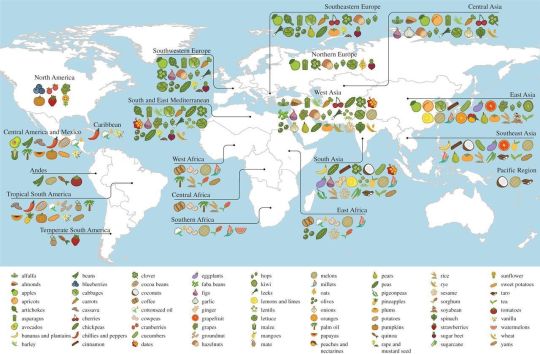
You can mix and match the crops, animals, and such as you wish, and you should definitively read the wiki page on center of origins and see some other less known crops.
If you have non-human civilizations, of course they'll have different packages. Carnivore or subterranean civilizations might be very different. But at this point, your imagination should be flying already and I don't have to hold your hand here.
Now, you have a rough map of your world at the dawn of agriculture! Congratulations! Depending on the historical period you're setting your world, you can start to draw countries and civilizations. This is where it gets complicated again. I might have to make a part two... But just with this, you already have a new world to use as you wish.
I'll make a worked example later to show you how easy it is if you don't believe me.
1K notes
·
View notes
Text
the russian starlette (prelude)

summary: after taking a job at starcourt, you accidentally get entangled with russians underneath the mall who decided to experiment on you, causing you to gain telekinetic powers
pairing: female!henderson!reader x eddie munson x steve harrington?
cw: none
word count: 1.0k
a/n: this part of the fic takes place in s3/the summer of 1985 and follows the storyline of s3 closely
✰ part one: the prelude
✰ part two: the experiment
✰ part three: the return (coming soon)
masterlist
i do not consent to having any of my works republished, translated, or posted to any other site except here. if you see my works anywhere but tumblr, it has been republished without my knowledge, consent, or permission
。.・゜✭・.・✫・゜・。.
god you wish you never took that stupid job at starcourt mall, but steve was a little too convincing...
"c'mon y/n, we'll go in, apply to a couple of places and if we hear back that's great and then you can save up for a car and i'll save up for college or whatever" steve explained as you sat in his car outside the mall
the engine was turned off, leaving you to contemplate in the silence, your head leaning against the window and your body facing him in the drivers seat
"i don't know steve... a job at the mall?" you questioned and he looked at you with eyes sweeter than honey
"look, you've been saying yourself you feel bad i'm driving you everywhere and that your mom would meet you halfway on the price of a car" he said, using your own words against you
"yeah and eddie's not around to drive me too" you said sadly
you sighed
okay fine, part of the reason you didn't want to get a job at starcourt was because your boyfriend eddie was touring around america with some new band called guns n' roses and it made you feel like the biggest loser that you're stuck in the the middle of nowhere indiana working at a mall
but you knew steve was right, and that you couldn't depend on eddie to drive you to school anymore, and that you felt bad that steve had been driving the two of you around the past few months
you knew you needed the independence so you sighed, and got up, your back cracking a little in the process
"fine, let's go get a job but i'm not dealing with anything with food" you said as the two of you got out of the car and shut the doors
"yeah i'm sorry but you really just can't cook for shit" steve laughed and the two of you started walking inside
。.・゜✭・.・✫・゜・。.
after a month at working at the gap, and seeing your paycheck, things weren't too bad working at the mall
steve got his job at scoops ahoy and luckily, his schedule somehow coincided with yours so he would drive the two of you
you had talked to eddie a few times over the past week, last time you guys spoke he said he was somewhere on the east coast and he was very happy for you and your new job
of course, you still felt like a loser working at the gap in hawkins while your boyfriend is an actual rockstar but steve made the mall bareable
plus, you finally became friends with robin, a girl you would always see around school but never talked to
the three of you would hang out constantly, and you were just happy in your little life of sneaking into the movies with them, or when steve would finish up before you and bother you in the store by trying on random clothes to keep you entertained till you left an hour later
that was until dustin came home from summer camp
you had finished up early at your shift at the gap, and walked over to scoops ahoy to bother steve and robin for the remainder of their shifts
it was nearing dinner time, meaning, most people weren't getting ice cream to eat, leaving the shop empty but you heard the three of them bustling around in the back
you rang the bell, and steve opened up the small window that separated the back room from the front counter
"oh hey y/n, we're just uh- doing stuff back here..." steve said, glancing behind him and then back to you
"wait it's y/n?" you heard dustin say and suddenly his face appeared next to steve's
"come back here, quickly and calmly, i need to tell you something huge" dustin said and you did as you were told
a few minutes later, dustin had explained how he picked up a russian transmission, and that they were trying to crack a secret russian code
hours after hours, you continued to listen to the same message over and over again till eventually you all figured out they were talking about the mall
which led you to the next problem, getting past the big scary russian with a big gun guarding the door
"or i could take him out" steve said nonchalantly
"take who out?" robin questioned
"the guard?" steve replied
"did you forget the part about the big gun?" dustin asked with an annoyed tone
but that guy was the least of your worries
after the secret elevator plummeted down to a crash on the bottom floor, and all five of you slipped through the elevator doors, you were on to finding more of the russians underneath starcourt
after walking for what seemed like miles, you all stumbled upon the hub full of russian guards, scientists, doctors, along with the comms room
and of course chaos ensued again
once in the comms room, you were taken aback by seeing someone in the room with you
robin tried to say the code to the russian man before steve started screaming and charged at the man, knocking him out
"you did it! you won a fight!" dustin exclaimed before a bigger issue caught your eye, the russian's were attempting to open the gate with a large machine which instantly made your stomach drop
alarms started blaring when the guards noticed the five of you, causing panic to ensue and everyone started running
your heart was pounding as everyone scrambled to outrun the guards, steve knocking over giant steel barrels in attempts to slow them down when you all ran into a room, slamming the door behind you
steve pressed his body against the door to keep it shut
"help me!" he yelled as the you and robin ran to him, pressing against the door with all your might
you watched as dustin and erica climbed up stairs and started descending into a hole in the floor
the weight of the guards pushing back seemed to be getting greater and greater
"i'll never forget you!" dustin screamed
"go!" you all screamed in unison as dustin shut the hatch
the guards eventually pushed open the door, causing everyone to go flying
it all went in slow motion as they opened the door, the weight of the push had sent your body flying to the wall, knocking you into complete darkness
to be continued…
#stranger things#eddie munson#munsons-melody#steve harrington#dustin henderson#eddie munson blurb#eddie munson fluff#eddie munson smut#eddie munson fanfic#eddie munson x female reader#eddie munson x reader#eddie munson imagine#eddie munson x you#eddie munson x henderson!reader#eddie x y/n#eddie munson x fem!reader#eddie munson x y/n#steve harrington x y/n fluff#steve harrington x y/n#steve harrington x you#steve harrington x reader
124 notes
·
View notes
Text
My trip to Taiwan
I took a break from posting because...I went to Taiwan! This was my first time going there, and I was mostly in Taipei. I had a great time and took many, many photos. I'll share some highlights here (along with commentary) to commemorate my trip.
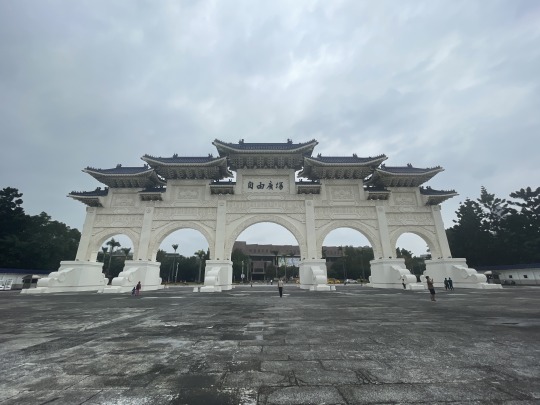

Left: Liberty Square 自由廣場
Right: Chiang Kai-shek Memorial 中正紀念堂
You can't tell here, but there was a row of porta-potties directly to the left of the archway. That was a funny sight. There was also a stage in the middle of the square. Maybe they do outdoor concerts?
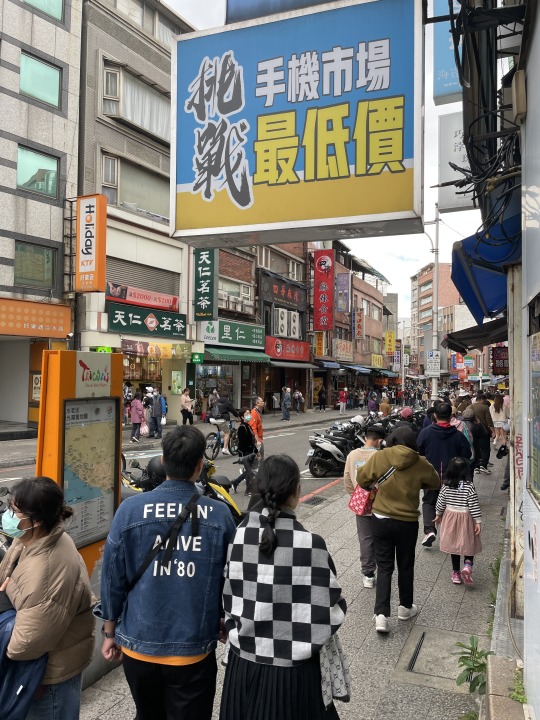
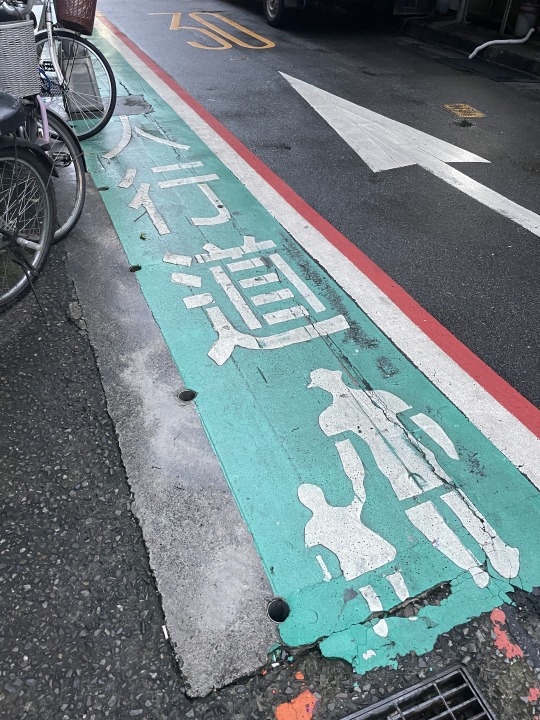
Left: Tamsui Old Street 淡水老街
Right: "Sidewalk"
Besides the main roads, most streets lacked raised sidewalks. Instead, they had a painted path. I had to get comfortable being very, very close to cars and other vehicles.

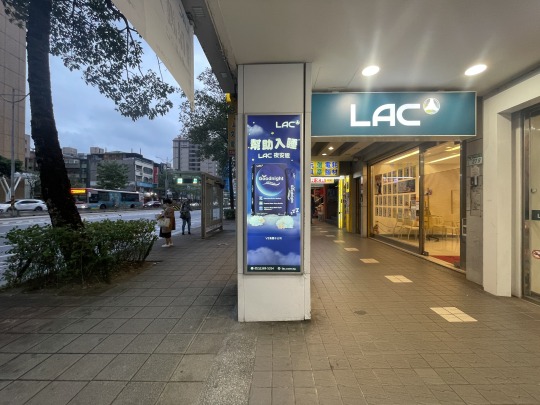
Left: Motorbike parking lot near Tamsui Old Street
Right: Covered sidewalk.
I’ve seen motorbikes before in China, but Taipei took things to a new level. Motorbikes were absolutely everywhere. I even saw this parking lot exclusively for motorbikes. They rule the streets.
In the busy downtown districts, you often don’t need an umbrella due to the covered sidewalks. You can walk for blocks and blocks while staying covered. This was pretty convenient on rainy days.
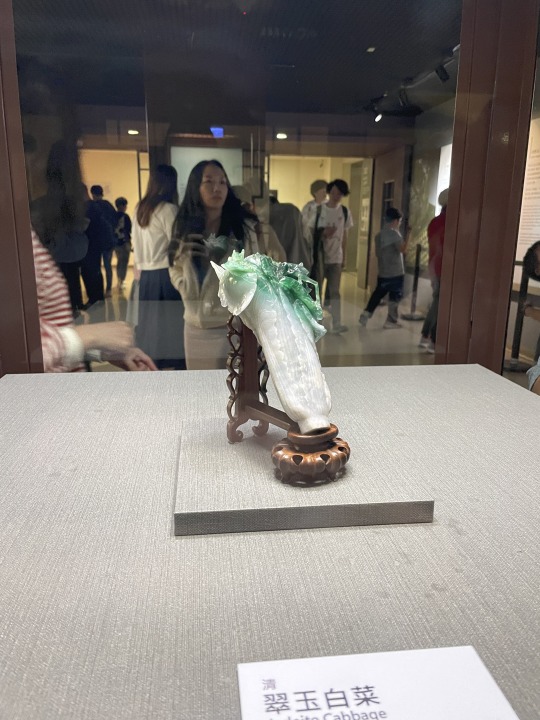
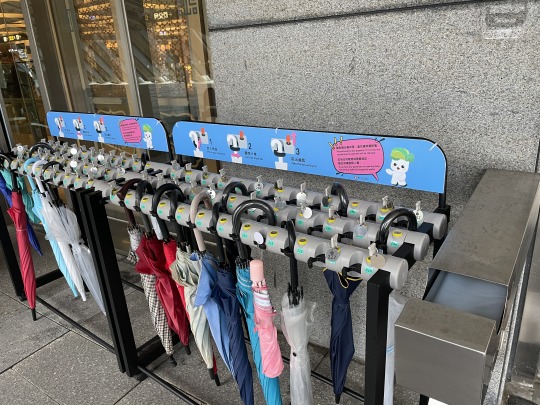
Left: Jadeite Cabbage 翠玉白菜 at the National Palace Museum 國立故宮博物院
Right: Umbrella rack (also at the museum)
Confession—I didn't think the National Palace Museum was that good. Probably because I've been to the actual Forbidden City in Beijing. And sadly, the Meat-Shaped Stone wasn't on exhibit.
In the US, some stores will provide a plastic bag for your wet umbrella. In Taipei, many stores had a rack or basket outside instead. Most were not as secure or elaborate as the one pictured.
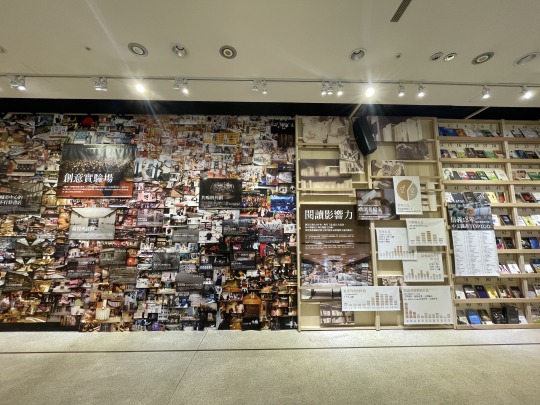

Left: Eslite Xinyi Store (bookstore) 誠品信義店
Right: Sun Yat-sen Memorial 國父紀念館
I bought a couple books and a Yoga Lin CD at the Eslite 24-hour bookstore. I only planned to swing by, but I think I spent 2 hours there. I definitely recommend checking it out if you're in Taipei.


Taipei 101 台北101
It was overcast when I went to Taipei 101, but the view was still nice. On the bright side, there was NO line. 101 is by far the tallest building around, so you really feel that you're looking down at the city.

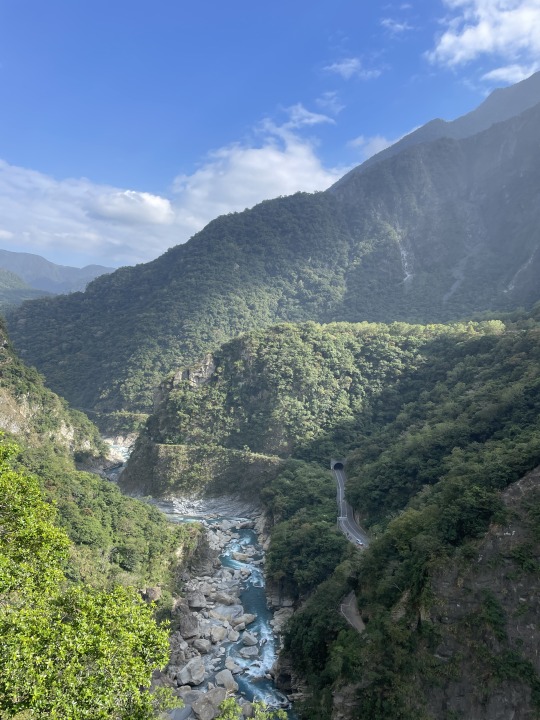
Taroko National Park 太魯閣國家公園
Taroko was the only place I visited outside of the Taipei/New Taipei City area. It's in Hualien county on the east coast. There were so many betel nut stores in the countryside on the way there.
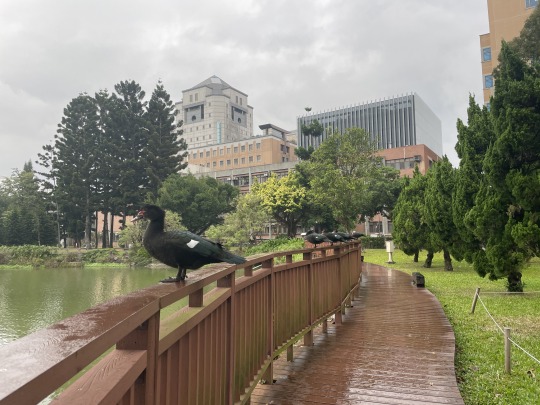
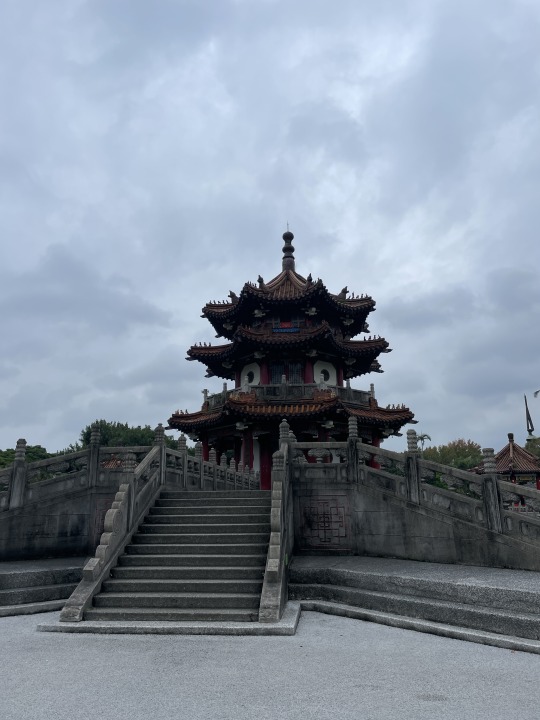
Left: Pond at NTU 國立臺灣大學
Right: 228 Peace Memorial Park 二二八和平紀念公園
Taipei has the best parks! They really put American parks to shame. Before going, I didn't understand why so many Taipei parks are tourist destinations with 4.5+ star reviews, but now I totally get it.
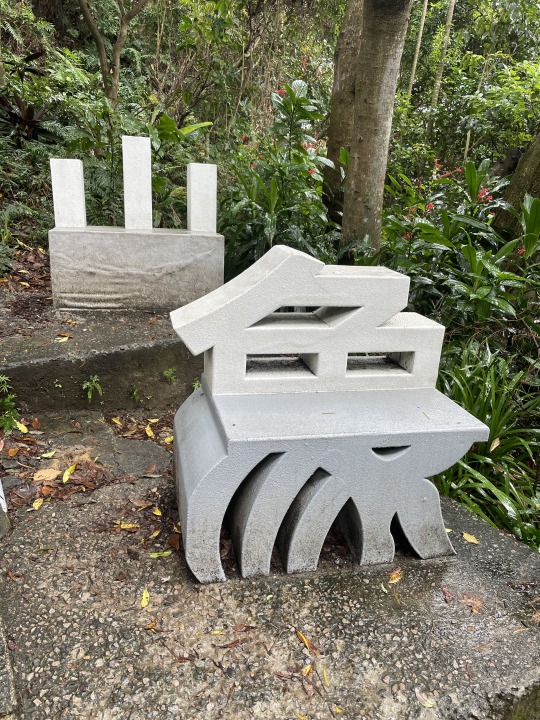
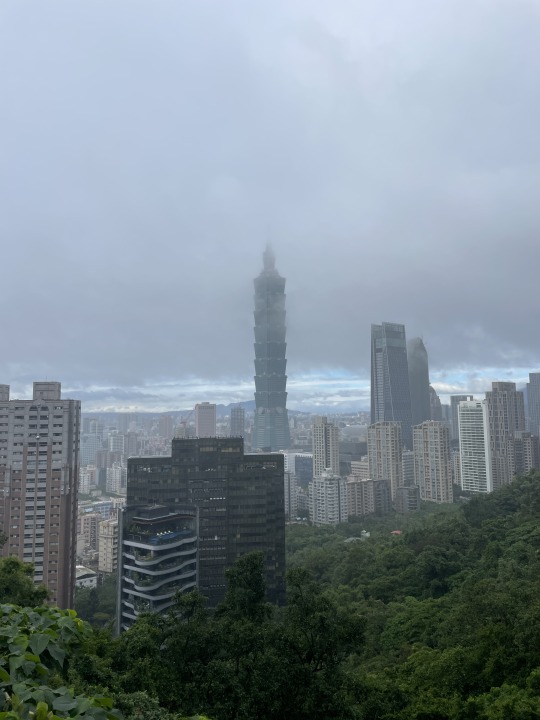
Elephant Mountain 象山
I didn’t realize how mountainous Taiwan is. Taipei is cradled by mountains, so there are many places to hike, even within city limits. I braved the rain for the famous view from Elephant Mountain.


Subway billboard 臺北捷運
The Taipei Metro/MRT was amazing. So fast, clean, frequent, and convenient. US subway systems are a joke in comparison. These are from an amusing series of billboards promoting riding etiquette.
Some other observations:
I was quite impressed by all of the English signage in Taipei. I think it would be very easy to navigate even if you don’t know Chinese. Many stores and small eateries had menus, signs, etc. in English.
I knew Taiwan had many convenience stores, but I was not prepared to see a Family Mart or 7/11 on every block. Someone needs to open this style convenience store in the US ASAP.
I saw numerous adds featuring Korean actors like Son Ye-jin and also kpop groups like IVE and NewJeans. I also heard kpop playing at various stores, whereas in America, I only hear it at Hmart.
I was struck by how many street signs and subway stops names used pinyin romanization. There was a lot of inconsistency and mixing of different romanization systems. For example, you have Taipei vs. Beitou (same character: 北).
There were many Japanese stores, pharmacies, and restaurants. Upon further consideration, this makes sense given Taiwan's history, but it stood out to me nonetheless.
Overall, I had a lovely time in (mostly) Taipei. As a big city (but not too big) surrounded by beautiful nature, there's something for everyone. I already want to go back! Of course I also want to see some other areas of Taiwan too. Maybe next year.
85 notes
·
View notes
Note
Do you have more lore of graham and arthur besides them fucking one time as well as their established jobs?,i love them so much and i want more of them.
I do! Their backstories are pretty flushed out by now, so ill put em below if youre interested!!
Graham:
Graham was born in London to a middle class family in the very late 19th century. His mother died giving birth to him, and he had no siblings, but his relationship with his father was good. His father did the best he could raising him, but had to work a lot to support their family, and often left Graham to his own devices. This didn't bother Graham at all, since it gave him the freedom to do as he pleased.
Graham's father owned a salvage shop (which is basically a Victorian thrift store), and they lived in the apartment above it. The money was nothing impressive, but it was enough to get by. However, since Graham’s father rarely left and Graham had no interest in making friends, the store was basically where he was raised. Surrounded by such a wide variety of oddities donated or pawned, he would occasionally come across old books and instruments relating to the sciences. He poured his life into these outdated textbooks and studying these strange instruments; quickly developed a deeper understanding of them than most scientists would dare to dream. Particularly, he was most fascinated by herbology, chemistry, alchemy, and anatomy.
When Graham was a teenager, his father died of scarlet fever. Graham had never been significantly impacted by emotion, and, while knowing he would miss his father, was not partially saddened. (Still this would impact his interest in creating cures.) In his will, his father left him a decent sum of money, the shop, and the apartment above it. Uninterested in continuing the business, Graham sold just about everything inside the shop at a heavily discounted price, keeping only that which related to his studies. Using this money and that his father left, Graham decided to put himself through college. This did not work out. He learned in his first year that the college taught from the same textbooks he had already memorized, and he understood the contents on a deeper level than even his professors. After three semesters, he dropped out and returned home.
Now equipped with money he had not needed for college and more confidence than ever, Graham used what was left of his inheritance to purchase that which he needed for starting his own experiments. He found a lot of success in creating elixirs of a wide variety; started with simple things like cough remedies, fever reducers, and soothing balms. He continued like this for about a year before delving into more ambitious elixirs. His success continued, though was briefly interrupted by an incident involving lye which left him blind in his right eye. He recovered speedily with one of his own cures, but did not regain sight. Soon after being blinded, Graham decided to take his work more seriously. He reopened his father’s shop under the name “Hurst Curatives” and began to sell his work. He saw rapid and wild success, as word quickly spread of his almost “magical” cures. All it took was a single request at an exuberant price from a nobleman to Graham for him to realize commissions could be very lucrative. Again, he never much understood moral codes, so he saw no issue when these commissions eventually took on a dubious nature. In a matter of five or so years, he established himself as a disliked but distinctly respected member of the community, knowing a lot of bad things about very important people. He is untouchable! He is rich! Life is pretty damn good.
Arthur:
Arthur was born to an immigrant family in the late 19th century. His path is more traditional, but certainly a success. His parents came to America from Scotland, settling in a large city on the east coast. His mother was pregnant when they arrived, and he was born not one month later. His family did not have much money, and lived in a shared home with ten or so other families. Since this made for a crowded and chaotic environment, Arthur spent a lot of time at the library, or reading on the outside stoop.
Arthur was not immediately captured by the sciences. Instead, he was entranced by fairy tales, especially the stories of brave heroes sacrificing everything for the good of another. Deeply empathetic, he was inspired by these tales of heroism and would carry them with him to adulthood.
Arthur did not have any formal schooling in his formative years, but learned to read and write early on from an older Scottish man who shared their building. It was enough that he was able to attend secondary school, where he excelled. During this period, he decided to become a physician, hoping to help people much like the heroes in his childhood stories. His teachers were impressed by his drive, compassion, and grades; enough so that he was put up for an academic scholarship, which he was awarded.
In college, and through to his doctorate, Arthur’s life did not see much excitement or change. He threw himself into his studies with a great passion, passing on a social life in favor of reaching his goal. He began a paid internship, at which point he began sending money home to his parents so they could live more comfortably.
His mentor, an Englishman originally from the outskirts of London, was delighted by Arthur’s progress and care. So delighted, in fact, that his mentor offered Arthur a position as lead physician not one year after receiving his doctorate, explaining that a dear friend of his was retiring, and had asked for a promising doctor to take over his position. Arthur accepted this offer excitedly, and was shipped off to London just as soon as he was granted permission to practice there. It’s not very long after his arrival, however, that he notices many of the cases in London are… odd. What, or who, is the cause?
61 notes
·
View notes
Text
I love fleeting connections with strangers. I was standing in line at UPS holding a giant box of papers to shred, and the man in front of me made a comment about how taller people like the two of us were often stronger than we looked which resulted in us having a conversation about muscle distribution and him accurately guessing my height just by looking at me. The receptionist at the hotel I stayed at when I was driving down the East Coast was 20 years old and an international college student from Ukraine—she complained about how expensive America was and I agreed with her. The other receptionist was a middle-aged woman who told us how she had such a keen nose, she didn't need to set timers when cooking or use a thermometer to check when something was done because she could just tell by the smell.
Some people complain about small talk but I love it. I love remembering that everyone around me is living a life just as nuanced and bright as my own. I love getting these glimpses into a stranger's head. Maybe I don't remember your name, but I remember you told me you had up to 12 dogs at one point including a 130lb rottweiler. I remember you wrote for TV back in the 60s. I remember you asked me how the newest Starbucks drink tasted when you saw I ordered it, and agreed with me about not liking coffee that was too sweet.
Tiny snippets of strangers lives now live in my memories, and I live in theirs too. I just think that kind of connection is really nice, y'know?
91 notes
·
View notes
Text
“Just a Mother”
a Sarge & lil Mama blurb || circa 1957
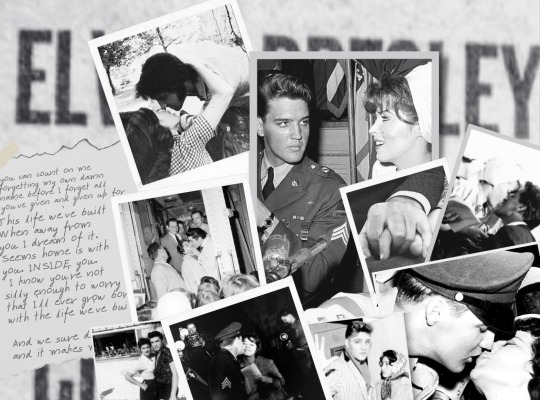
Summary: just adding some back story and motivations to Elaine’s side of the story presented in The Beginning.
Warnings: None really, except for talk of 1950’s gender roles, throw away line of masturbation and motherhood
“Is that all?” was the most common question asked Elaine after she first piped up in class and said she wanted to be a mother when she grew up.
A twelve years old girl, born with the luxury of living in the progressive halfway mark of the 20th century, belonging to a prosperous middle class and raised by lenient and liberal parents ought to have more ambition. Or so her impossibly cool, east coast imported, die hard beatnik geometry teacher chided her lovingly.
“A teacher then?” Little Elaine had fudged, meaning in her heart of hearts she wanted to raise little people, she wanted to make a difference with another generation, she wanted to be loved and depended on.
And why shouldn’t she? Her mother seemed happy enough being a mother. Her mother only seemed fretful when it came to father’s business. Juggling work and home life was the only cause of strife Elaine could perceive between the two, and it ingrained the notion in her little mind that keeping it separate was the key to domestic tranquility. Children, an only child like herself or a dozen taken in by the neighbor, never seemed to be the cause of any true regret between a couple.
“Oh darling, that takes money.” is what mother said when Elaine told her that she wanted a bunch of kids. “And a lot of effort and patience, which you may have but -it takes money, too.”
The white-picket-fence-American-dream could only afford two or three little ones and a new car every five years, it would seem. Elaine would rather forgo the new car and have another child, she told her mother.
Those squabbles over money and the business that Elaine witnessed between her parents ceased altogether when Elvis Presley’s infamous yawling stuck gold on the national charts. She watched then as her parents put their feet up and joked around the family dinner table that maybe they should have given Elaine that longed for sibling, a little bother or a sister. If they’d only known college tuitions would be paid for by a rockabilly record.
That’s when Elaine decided she’d need to marry a wealthy man. Or perhaps father would give her an inheritance early, a dowry of sorts. The first Rock n Roll heiress in America. Mother had warned her that their new wealth would attract no good boys who wanted her money without sticking around after to do right by her.
“Is that still all you want, darling?” Mother had asked when Elaine hit eighteen, right before God took her. “You’ve the opportunity to do so much more.”
“Miss Gladys says it’s the most important job of all.” Elaine had insisted, wounded that her own ambitions should be always so belittled.
“Well, I'd be careful of what you adopt from Miss Gladys.” her mother had warned, a funny look in her eyes, “I’ve a feeling she has ulterior motives for directing your interests that way. You should get out before you settle down, see the world, try other vocations out.”
That had worked for awhile. First Elaine had helped in the studio and then in the hospital and then she had studied hard to become a teacher, forever gravitating towards being useful, being needed, towards nurturing others. For her it was only ever that, that was all of it, that was enough.
Ambition and experience, that’s what everyone encouraged her to seek after mother’s death. The middle aged women, those who had chafed under their own domestic responsibilities and been too late to taste the freedom Elaine longed to squander were particularly insistent. Ambition and experience. Those were things that Elaine had plenty of time to indulge before marrying and being chained to highchairs and the marital bed.
Perhaps too much time, Elaine had begun to think. She was antsy, floating around in her dead mother’s circle, working herself to the bone to forget her loneliness and making little found families with any who’d let her dote on them.
No one to call her own beside her father who’s booming business needed her less and less. He needed her in his grief, but that didn’t mean he accepted her help.
Gone only a few months she had already begun to miss Elvis, and to resent his imposed law of abstinence while he was away. She wanted to marry, she wanted a man to give her children, she wanted to have a life to call her own at long last -she didn’t trust anyone to vet her prospective husbands save for Elvis. And the cycle would begin again. She cursed him in her head, and took to watching men as they swam in the public pools, distracted by muscled backs and furred legs as she taught Mrs. Davie’s children how to swim. She wanted a man, she didn’t know what for but she wanted one.
Elvis had woken her up to that sudden ambition, and she sought it with the single minded drive she put into logistics for the March of Dimes functions. She watched the way these men talked and walked and carried themselves, the ones who curled in on themselves and the ones who swaggered. The ones who whistled at her and the ones who opened doors.
What she had initially thought cruel and lewd teasing on Elvis’ part that night in the kitchen she grew to realize was him merely looking out for her welfare. He wanted her to taste the danger of attraction just enough that she’d know what to guard against. Though every passing day made that harder, charming waiters and slick doctors and grabby handed father’s of children she nannied all sparked an interest in her that had been dulled before.
There was curiosity in her as to what they wanted from her. She knew what she wanted -children, but what did they want? She would have to ask Elvis. She would have to wait for him to get back from a two year deployment and boot camp besides.
Alone in her room at nights, surrounded by text books and mother’s diaries, Elaine wasn’t sure she could hold out that long. She had heard that when God planted a child in a woman’s womb it came out from between her legs. More and more she found herself blindly and ignorantly touching that little baby house, finding it weepy and throbbing, as if as heartsick as the rest of her at the waste of her young and empty body.
Once she tried to put a finger up there as she’d heard doctors did in labor. It pinched and stung and she pulled it out hurriedly, her heart pounding and cheeks hot.
That was another warning all the women had -that children hurt. Making them and bringing them forth. Elaine knew nothing about what went into making them, though she could see that growing them stretched and tore women’s skin to accommodate the new life. Still, like an arduous adventure or a perilous quest it all seemed rather glorious to her, thrilling even, to be growing something that would outlast you.
“Just a mother? You don’t want to be anything else?” her Humanities teacher asked her, senior year of high school. An idiotic question, as if being a mother meant she couldn’t be anything else while at it. But that Humanities class did teach Elaine one thing: men must always strive to build and create a legacy, forever pressed to leave some creation behind with their likeness imprinted on it.
Women can make such a thing in nine months and from it can come millions of copies, millions of descendants. Her lack of ambition to conquer Wall Street seemed to suddenly click sitting there listening to a man drone on about the lasting impact of crumbling ruins.
They’ll never manage what we can, she realized, they can’t create a living thing like we can, they can only shape stone and clay and call it wondrous, while we can fashion blood and bone and cartilage and birth a soul.
It made sense that through the centuries men would define motherhood as “just” that. It was too threatening a thing otherwise, and a millennium of the scorn had infected the women, too, until the miracle of children was cut down to size, to something a little less holy, a little less impressive, little more than drudgery. Why, darling, don’t you know you can go out and work for another man who is not your husband these days? You can push that man’s papers about and endure his groping, come home and endure it from another, too. Who has energy to be a mother after that?
Yes, Elaine would settle for being just a mama. If Elvis would just come back already and help her choose a daddy.
Yes, Elaine would settle for being just a mama. If Elvis would just come back already and help her choose a daddy.
#sarge and lil mama#just a wife#elvis fanfiction#mine#elvis fanfic#elvis imagine#elvis x reader#elaine presley#Elvis blurb#the most wholesome breeding kink#you ever did see
132 notes
·
View notes
Text
The Sign of Four: The Story of the Bald-Headed Man
The Victorians were rather into what is known as chinoiserie, the European imitation of Chinese and other East Asian artistic traditions, although the popularity had somewhat peaked by this point.
The stethoscope had been invented in France in 1816 by René Laennec and the two-ear version was commercially available from 1852. The practice before and without one - see A Study in Scarlet - was to listen to the chest by applying your ear directly too. This was a bit awkward when dealing with a woman, the reason Laennec invented it in the first place.
We've seen Tokay before, in "The Last Bow".
Since tobacco came to Europe, there have been people who couldn't stand the smell. James I of England/James VI of Scotland wrote A Counterblaste to Tobacco in 1604, one of the earliest anti-smoking works. He would impose an import tax on tobacco, then later made it a royal monopoly.
It was also considered taboo to spoke in front of women for much of this period; hence the use of smoking rooms. It was also seen as unladylike for a woman to smoke at all; if she did, it evoked an image of prostitution. Unless you were working class, in which case women widely smoked.
Hookah comes from the Hindustani word "huqqa". Hindustani is also known as Hindi-Urdu; Hindi being the Devanagari-written version used in India and Urdu the Pakistani version written in the Persian alphabet. Both countries have tried to make their two versions somewhat distinct; Hindustani is not used in official terminilogy in either. In speech, the two are pretty much mutually intelligible, if you keep things simple.
The hookah remains popular in South Asia and the Middle East; smoking is not specifically prohibited in the Quran, but in recent decades, a number of very prominent clerics have declared it haram (forbidden). In much of Europe and North America, indoor smoking bans cover hookahs, places that offer them have had to switch to tobacco-free version.
In any event, hookah smoking is really bad for your health - you're basically inhaling the equivalent of 100-200 cigarettes in a single session.
Jean-Baptiste-Camille Corot was a French realist painter. Works of his can be found in the Louvre and New York's Metropolitan Museum of Art, among various other galleries.
Pondicherry, which we've seen mentioned before, is a city on the south-east coast of what is now India; it was a French territory at the time - the British had taken it more than once, but returned to them each time, the last time in 1814.
The lightweight division of boxing today covers weights of 130 to 135 pounds. The current British lightweight champion is James Tennyson, but he has not fought a professional bout since a technical knockout to Jovanni Straffon in 2021.
Agra, located in Uttar Pradesh, is best known as the location of the Taj Mahal, built on the orders of Mughal emperor Shah Jahan between 1631 and 1653 as a mausoleum for his wife Mumtaz Mahal after her death in childbirth in 1631. He is also buried there himself.
£500,000 in 1888 would be the equivalent of over £54m at 2024 values. Not a bad chunk of change.
19 notes
·
View notes
Note
is 9/11 funny? 🤔
im putting a rare CONTENT WARNING on this post for frank discussion of 9/11. there are no pictures (they are linked and no gore), just words.
i feel compelled to answer this since 9/11 was on my mind lately. very american thing to say lol. anyway: i was thinking about the emotional/social disconnect between generations and how difficult it is to convey how vastly and terrifyingly different things became almost instantaneously. american has been in a freefall since, we've all just become accustomed to the perpetual pit in our stomachs.
9/11 is the point i think most people can point to as the moment when america became completely bugfuck insane

in a complete failure of leadership in a time of legitimate fear and confusion, the american right-wing government used the loss of civilian lives as casus belli to start a war predicated on a complete lie with the sole intention of lining their own pockets. 9/11 has been invoked countless times as america's free pass to run roughshod over the middle east, eliminate personal freedoms, RUIN AIRPORTS FOREVER, and enforce a narrative of victimization in which we were attacked by people we trained and armed ourselves. it's insane how fucking bad the bush years were culturally and its honestly hard to convey to a generation that doesnt know what it was like before all of america started suffering from a gas leak. as such, the attack has come to been associated with opportunists, grifters, warhawks, racists, and the biggest monsters in modern, if not all of, history. no exaggeration.
its human nature to want to sully the sacred. for 20 years it was a surefire way to hit ANY conservatives berserk button instantly. then i guess when trump had to account for one of his classic bangers, conservatives decided they didnt give a shit any more
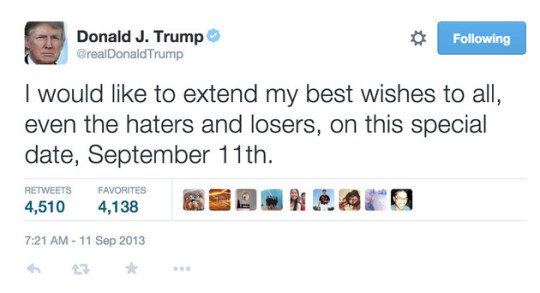
the older and more cynical/internet poisoned i get, the more i start to sincerely believe that the ongoing attempts to shield people from the gruesome reality of what happens to the human body during a violent death has not done much to improve the human psyche. there are plenty of (good) resources and first-hand accounts about how unhealthy it is to repeatedly expose yourself to human death (like, i dont think its good to sit on ogrish and likeleak all day. it is bad to jack it to human suffering and mutilation lol), but now we completely refuse to engage with it at all. this is the part thats complicated for me lol. i dont think people should be FORCED to look at gore. i dont think it makes you a stronger or "better" person. but exposing myself in small doses to The Horrors has given more more of a uhhhh...understanding. as someone who was a kid and lived literally 3000 miles away, the way the culture shifted around me was significantly different than on the east coast. there really is a lot of information that deserves to be known by more people as common knowledge.
dont worry im not 9/11 truthing lmfao. im talking about things like the oral history of 9/11 book which includes an account from an EMS worker who had to argue with a woman who was just lungs and a head over putting a black triage tag on her. the new york times has an enormous archive of survivor accounts detailing how, in the middle of evacuating the second tower after the first plane hit, they were told to go back to work and stay in their seats, leading to an unforgivable number of needless deaths. there's the families that refuse to accept that their loved ones are "jumpers" in attempts to identify them because jumping to your death is suicide and bars you from heaven. can you fucking imagine? the idea of being forced out of a window because of the unbearable heat and into certain death freefall is horrifying enough to even have to contemplate but to have your family members pass judgement on you for it after would be beyond mortifying.
there's a lot i think about when i think about 9/11, even when i clown on it. the man who tried so hard to climb his way to safety and fell to his death while the camera watched helplessly. the scream of the man on the phone with 911 for almost 20 minutes before the tower fell on him. the sheer, impossible to comprehend scale seen in the photos of people hanging out the windows for air. or what it felt like to see the second plane hit; the ice cold terror of realizing this was not a horrible mistake after all.
ehhh but on the other hand
youtube
lol lmfao
219 notes
·
View notes
Note
No, US american "culture" is a filthy parasite that must be exterminatrd. There is no us culture not filtered by hate and obsession with fictional media such as television and movies. We have no history that isn't violence and rape. There is black culture and culture brought over by others that has been stolen and twisted into an ugly, vile child. It must be exterminated for the world to propser.
I appreciate the fact that you're trying to participate in the conversation, especially as an American yourself, I presume.
Americans do have a culture. You have a shared history, generally speak the same language, share in traditions. You have regional differences to distinguish yourselves by, and foods that people in other corners of the world don't eat. You have unique struggles that can be similar to that of people from other nations, but that are ultimately your shared own.
Americans, in the broad sense, use words in the English language that English people don't use. Your language evolved in a unique way from them. That is culture.
You have styles and genres of music that originated on American soil. That is culture.
You have a history of violence, yes, but also of victory, of revolution, of the small people fighting for their freedom and rights, and being strong for their people and their country. That history is also culture.
And frankly, I'm sure I'm not even going to convince you with all of this. Who am I but a small speck on the other side of a great big ocean, right? What do I know about America?
So just let me reiterate the only thing I hope you'll take from this. You. Are. Of. No. Use. To. ANYONE. Self. Flagellating. About. The. Country. You. Are. From.
You don't help your online friends from far coasts who are forced to engage with you using American social norms. You don't help victims of war in the Middle East. You don't help the residents of American territories that still haven't got a right to a vote. You're not helping young people of colour in your prisons on a blown-up drug charge that are being denied their right to vote. You are not even helping yourself, because newsflash, the "good person" high you get from patting yourself on the back for having a woke opinion doesn't last forever, and in the end you will be left a hollow shell of self-hatred.
Unlearn that shit. Pour your energy in stuff that is worthwhile. Ask your online friends about their cultures. Share in the joy that is having international connections. Join a local activist group. Read about countries on Wikipedia and fantasise about visiting them someday. I don't care what you do with your time. But don't spend it condemning a country and the people in it who love it just because you happen to feel bad or guilty about the place you grew up. You're not doing anyone any favours with it.
#globalisation#america#american culture#usa#i get that sometimes it feels like all you can do is hate but come on man. doesnt it get tiring
34 notes
·
View notes
Note
my randy plush is coming in the mail soon how do i make it stop i am frightened
it you absolutely CANNOT stand to have randy delivered to your home, here is some NOT LEGAL ADVICE from yours truly:
move house, before it arrives
burn your house down and fake your death (before it arrives)
intercept your local postal worker before your mail next arrives to inform them that your house has moved, and give them a phony new address
Call your local CIA operative over at 951-262-3062 and when the robot voice asks for your 6 digit employee credentials, type 3-9-5-2-4-8 for the first access code and then 1-9-8-4 for the second, that should get you in. I know it works bc it's my uncle's password. He doesn't work for the US government, to be clear, I'm not sure where he got it from. Anyway, then it'll ask you for a nuke launch code. You want 1260 for the western USA, and 1216 for the east coast. If you live in somewhere like Kansas, you'll have to find something local to blow up instead, as the federal government decommissioned the bunkers they had all over middle america. budget reductions, man. if kansas and nebraska get into a war, they can simply fight it out amongst themselves WITHOUT nukes. Windy state, last thing we need is the radiation blowing over to somewhere useful. Now, they use the old site grounds for growing corn. Means the CIA doesn't have to pay maintenance on the missiles they used to house there AND they get to sell a modest amount of corn per year to subsidize producing missiles to go in even funnier locations. the corn money only amounts to about $46.21 annually, but hey, it’s $46.21 the CIA wouldn’t have had for their next missile otherwise, right? anyway, I doubt your local postal service would deliver your randy plush after a nuclear blast, but maybe your mailman is, like, REALLY dedicated. Actually, now that I think of it, there was TOTALLY a whole ass video game about this very concept. Nuclear apocalypse, mailman... 'Ring a ding ding, baby', what the hell is up with that? Ah shit, where was I going with this again? Oh, right. Sorry!
burn your house down (before randy arrives)
Hope this non legal advice helps you!
122 notes
·
View notes
Text
How Europe underdeveloped Africa and its legacy
first and formost before i break this down, this is not a post for white people to express their guilt, or savoir complex or love of historical revisionism. you'll not just be blocked, you'll go on a block list on this post, don't do it to yourself, i wont even have to be the one to do it. secondly this is a covering of the broad themes, lessons, and understanding within the book and what we should learn from it. third, i will often talk from my own perspective from which i will round to a larger context.
part 1- history and anthropology
As someone who has grown up black in the us, i grew up with a particular understanding or idea of Africa, the slave trade and the way America and Europe came about. you hear about tribal or ethnic disputes in the context of modern Africa and hear quite a lot of blatantly racist things about Africans. which caused me to get very into history, to which you learn when it comes to Africa there's not a lot of great places to start. this is something quite similar to the various indigenous peoples of the Americas as well. this has always been presented to me as a fault of Africans for not having history and is a long standing idea of white intellectuals from the 1800s to the Joe every man of today. the truth is Africa has history, there's no land, that has no history and Europe just devalues histories not associated with itself. there's a absolute glut of kingdoms, empires, languages, historical traditions, governing styles, cultural roles, trade networks etc etc. the fact of the matter is, that there's just very little Europeans want to learn about Africa that isn't to colonial ends, even today.
This is something Walter covers in great detail, to such a point that even as someone that has been purposely elbows deep into listening to everything i can find on African history i still had to go look up various pre-colonial kingdoms and figures. there is not a region of Africa that he doesn't take time to address in at least some detail, from Oyo and Ashanti on the west African coast, to the north of the Maghreb with Morocco and Algeria, east to the great lakes region, the horn of africa and south to the Zulus, koi koi, and Nguni peoples and kingdoms. The extensiveness to which he covers material forms of production, trade, and methods of historical preservation of culture, the types and breath of items, created and traded all through like cloth, glass, iron working, artistic ventures like bronze sculptures of benin and food production and cultization and the formations of various styles of rule, early democracy, and other such information put to bed nearly all of the non-nonsensical ideas that africa was a grand continent without progress, innovation, or skills and everything great, large, or more complex than rubbing to sticks together came from europe or arabs.
The book delves quite deep into the mythology of intense african slavery and violence which would be later used by europeans to justify colonization of africa to each other, said colonization, i will swing around back to much as the book does.
The middle passage, the triangle trade, the atlantic slave trade, these are all names for the event that was one of the chief reason to the economic and scientific take off of europe that would lead to industrialism, with the other being the colonization of the americans. stolen land and labor pushed the european world from not much a concern to anyone but those who had to deal with the crusades to the paramount power that controlled nearly all the sea trade, and held large swaths of territories of the world. we all know most of that, but walter ask the question on the other side of that coin. what did the slave trade do to africa? and why did they participate? the short answer is it changed the entire way african economies functioned and lessened the possibility of growth not just of kingdoms over territories, but of production and developement of sectors such as iron working, glass making, and agriculture. and in a very literal sense was one of the earliest forms of the phenomenon known today as brain drain and depopulation. we quite literally will never know the amount of people stolen or killed for slavery, we only know that as the rest of the world experienced high population growth africa and the americas started to experience intense depopulation. these phenomena weren't incidental they were known, and admitted as purposeful by figures qouted in the book. The african leaders at the time how ever were stuck between a rock and a hard place, many noted not just the importance of guns, but also recognized the importance of population growth at the onset. the game however being rigged from the start would have taken a miracle to over come. japan was the one country to escape colonialism in most meaningful senses, and that was because the dutch taught them how to produce guns and would trade with them "almost" as equals. these are also things addressed by rodney, the sale of arms was often highly lopsided, with Portugal and dutch traders only being willing to trade badly produced or broken guns, low quality powder and shot for slaves. this would not change until europeans would learn of other african products that they could make us of in their markets as raw materials such as ivory or kola nuts, this change would not happen for quite a while and mainly after the Europeans had already built their industrial bases and had taken total control of trade routes and begun to flood African markets with "cheap" products. the combinations of factors both purposeful and accidental shifted the African economies into a near total reliance on Europe economically and militarily but not yet politically. these are all expertly researched and explained to a point it is nearly impossible to refute any points. This points are all also something i can confirm from nearly every single source that ive looked into on African history.
part 2 -colonial "development"
This is a portion of history ill admit to doing my best to stay away from, generally much of my knowledge on it till this book has been on what happened with various kingdoms that fell in the late 1800s and early 1900s or by the various oral and 3rd hand accounts of what peoples familes, parents and even political elites went through. ill be frank, i did not go into the depth of the horrors of what happened with slavery, slave raiding, and its secondary effects, for this section and the next ill have to go through quite a lot. ill try to tone it down as best as i can, but on some of it even the implied parts are going to be horrid. I believe it is however important to face those head on, to truly understand the so called "white mans burden" or the reality of what that meant was.
colonialism meant making the final step, taking africa politically and physically. europe made the leap whole heartly to take all of africa, land, people, and any potential valuables, resources and to exploit everything they could get their hands on to the fullest extent possible. i do not use anything in the prior sentence lightly. Europeans like to play word games and often, the idea that they ended slavery in any meaningful sense is false, and ill come back to that in the final section. during the period of colonial control europeans destroyed just about anything of the prior rulers they could, and stole anything they could. theres a likelihood in my mind that theres many and african sculpture, painting, and cloth or glass work that sits in the home of a collector that got rich off the stolen plunder of africa. these includes many villages, cities, and palaces and shires and places of worship and places of craft. whole cities were destroyed such as kumasi, taking with it histories, architectural stylings and methods of production.
during this period was the final shift from internal political and economic growth to purely serving the empires to which ones lands belonged. no longer would rulers push for education reforms or challenges on religious bodies to strengthen any part of the nation, it was a total transformation into a form of state slavery. this is as metaphorical as literal, europeans would begin to change agriculture to be primarily centered around cash crops and mining labor to which labor was forced. people were made to pay taxes in the modern sense through the wages made through said labor. these taxes were in turn used primarily to fund the upkeep of oppressive forces and funding the check books of colonial governors, an insanely tiny portion of these funds were used for anything besides extracting wealth and resources.
the various governments put little to no money, research, or development into anything but cash crops and pulling things out the ground. the only times they put money into schools, training or even medical resources for people in African, it was for better wealth extraction and always the bare minimum. i believe (don't have the book in front of me rn) west Africa (from west of chad and south of Algeria) only had one university until the late 50s. the industrial sector of Africa was near completely killed, Africans in settler areas were not allowed to own even small scale industrial machinery such as cotton gins or fruit oil extraction machines, in non-settler state areas generally only peoples brought into Africa for the purpose of being a separated class of petite boug representatives for the colonizers were allowed to own industrial machinery. electricity was mostly for those same classes of individuals, hospital access, education access, pretty much anything you need for a community to survive esp in the modern era was highly restricted from Africans. To say that Europe "developed" Africa in any sense is beyond a bold faced lie, and it was something ,Rodney points out, that Europeans were quite proud of until they started to face push back for the level of humanity and exploitation they were facing. Once they started to get pushed out they changed their tune to the lie of African development and modernization. just like the lie of ending slavery for moral reasons and invading Africa to end slavery. Speaking of ending slavery in Africa, Rodney points to several figures who openly gloated about how they ran their colonial post or corporate holdings as slave plantations. king Leopold is one of the more famous examples of it, but far from the only one, many took delight in their cruelty. famine became endemic in regions that were the origins of many foods and cultivates crops, as all the agricultural process that could be shifted to cash crops were. Roads and trains ran from the mines and plantations to the seas and very little else. Various things needed to export raw materials were built with slave labor, like a airport in Kenya built by hand, no machinery via forced labor of Kikuyu peoples
Europe's only goal in Africa was land and profits, the same as in the Americas. genocide, slavery, starvation campaigns were common tools of colonizers in Africa all the way up to today, which i will re-address in part 4.
part 3 - education, traditional and political
Education is a very clear and important part of modern life, but also for building a nation, and self dependence, so it is of no wonder than colonizers thought that it should be restricted in Africa in regards to Africans. The various quotes and framing that Europeans used to dismiss the idea that Africans should have access to any form of formal education sounds exactly like quotes pulled from the most vicious of slavers of the prior centuries in the US and Haiti. One of the most prominent ideas that was education would "spoil" Africans, was a sentiment was also expressed by slavers. this section of the book is very much facts and figures on just how little access to education there was, how little funding went into it vs the amount of profits coming out of the various regions as well as how this was over come. two of the prime ways that was done according to the book and much of what Ive heard prior, was through the use of missionary schools or independent schools. These schools were primarily funded not by the colonial governments but by the peoples seeking education, their families, and so on, with the expectation that those educated would teach the rest of the family. education how ever was shown to not really pull people out of poverty nor to really give African peoples the possibility of positions of power or influence. this was such a near universally a rule, Amilcar Cabral, revolutionary leader and agricultural engineer even spoke to his personal experiences with being educated far beyond the man in charge of him yet having zero say in his job, his boss was renownly a dumb man. This was not an uncommon thing. Rodney goes well into it, and this just exemplifies how Europeans only saw Africans as a source of cheap and "unskilled labor". Access to education even if funded by the peoples seeking education themselves was clamped down on sharply once revolution was on the wind. Those who know the patterns of history though would have known that the clamping down made that worse, it simply accelerated the wants for education, as well as for independence.
part 4 - modern Africa and modern euro/america
When the cards started to fold on empire they took many different routes to lessen the fall for power, France tried blowing thing up and killing cattle and destroying things needed for civil life, a all call for genocide against Algerians. Britian, Portugal, most of them tried the same things, but they were pushed out in some ways, and when that became obvious they turned to the small group of political insiders they rapidly trained to take over in their stead. for those that weren't under the control of the colonizers they turned to the coup and military dictatorship. very few of the revolutionary leaders of africa were able to stay in power, many turned toward methods some would call authoritarian. without the context of what was going on and how unstable the situation was for these leaders and just how quickly and violently these revolutions could be overturned, it would be easy to take these figures as just becoming despots without reason, some of them really did become despots who just started functioning as neocolonial cops. This brings us to the modern era, and the current method of colonialism not just in africa but much of the world, Neocolonialism, or as i like to call it "home rule".
European nations were not ready to give up control, but they decided they would be willing to give up the appearance of direct rule. economic decisions, the political direction of countries, borders, very little of the modern africans situation was not directly decided on by europeans or americans. financial institutions such as the world bank and IMF lend these governments that had to try and start building actual nations with functioning economies loans with interest rates they would not be able to pay back in time, with conditions that made it even hard to meet the internal goals or pay back the loans and additional conditions of economic control by the IMF for failure to pay these loans. colonial governments such as France forced nations like Mali to pay taxes till recently, and nearly all the colonial powers set the trade rules between them and their "former" colonies in Africa. very few leaders were able to chart much of a path for progress or development that met the needs of the people before these various things snatched much of the independence back away from the people, pushing Africa away from shifting toward an agricultural sector that feed the people and an industrial sector capable of growing the economies or a scientific sector able to make adjustments or provide notable push in any direction. Fifa has more say in policy when they decide to host in a country than the people or even large segments of the governments of Africa. Nkrumah and Rodney both in their respective titles showcase this well, however neither would live to see much past the end of overt colonial rule.
Today there is a larger push against neocolonial rule and economic control than prior, organizations such as BRICS, china's one belt one road policy, and smaller grass roots works and various coups have shifted us to a different situation in Africa than what it has been in for the last 80+ years. However this is not a wholly different situation to that my grandmother would have heard of. much of the continent is still very much under euroamerican influence, the us of slave labor or near slave labor conditions is still a significant factor in the economic relationship between Africa and its former colonizers, which is seen very strongly in the Congo and in coco production. Africa is still yet to industrialize in a manner that matches its needs and this is generally at the behest of its colonizers, and in the majority of the continent the colonial capitalist ventures still own land and resources they stole and murdered their way into, settler property relations have also been solidified in places like south Africa. i would believe that Rodney would say that say that Africa still has a long way to go if he was still around.
The themes of the book were quite complex, and it was refreshing in many ways to be presented with such a sober look into Africa. Read the book, understand what its saying and try to use a similar level of consciousness, nuance, and thought in your day to day analysis of the world around you, and we may have a chance at fixing this ship.
To depart from the contents of the book, i would like to address the white man in the room. Europe, its role in history and its modern role in history, like I've said at the top, not time or place for white people tears. I'm going to be brutally honest, and I'm going to combine the thoughts and finding of not just Nkrumah and Rodney, but also figures like Fanon, Malcom X, Kwame Ture,Rev Martin Luther king Jr and many others of the course of Africana histories and philosophies.
Europe, more particularly Western Europe, has spent the last few hundred years visiting horror on horror on the world, when it comes to the modern era, they simply have not stopped. the damage Europe as a bloc has done, much like the amount of people who were enslaved or killed for the slave trade, will never be full accounted for and that tab just keeps growing. There is no sign of it slowing or stopping. Empires don't like to stop existing, this is something those interested in history know very well. The problem is that Europe cannot be honest nor up front about this, be it the League of nations or the EU and America, or even in the face of the UN, Europe and its Settler states it spawned is just as addicted to domination and profit seeking at all cost as it was 100 years ago which was no different when the slave trade began. Europeans/ White people as a whole as still strongly in the belief that they have a moral high ground to speak to the rest of the world when the truth of the matter is for nearly 500 years, white peoples flying European flags have been histories biggest villains. even in the 21st century, Europe's role on the world stage has been that of a vampire. sucking the life from others to sustain itself. it is still violently racist and xenophobic, which is ironic for peoples who have literally invaded the vast majority of the world, nor is it any more moral or upright today than on the eve of colonialism in the Americas or Africa or any other portion of the world. the EU can barely come together today to denounce blatant acts of genocide and white people are finger waging about anti-LGBT laws in places they couldn't point to on a map (im not happy about anti-lgbt shit, im trans bi and poly this shit actually tears me up). Europeans and their settler offshoots boast about the safety of their cities while actively being the cause of the violence elsewhere. This is all to say Europes fucking evil ya'll, which we should all know at this point, but to further it, they aren't really going to stop as that's what its designed to be. these nations aren't going to suddenly produce radical leaders who are going grow morals or empathy and compassion and move us closer to a just world and fight climate change and help develop the global south or anything like that unless some extreme changes happen, not just among the ruling classes, but the everyday person because like i noted, its policies are racist and colonial and imperialistic, but that really only last not just because people aren't willing to guillotine people over it, but because a substantial enough portion of the populace that they care about are happy to be that way or are passive about the suffering of black or brown people or poor people. they will accept the idea the x group of brown people are homophobic or terrorist( never questioning what terrorist even means) and accept that they should constantly be bombed or killed or have their land and resources stolen, which if people cant see the parallels to the largest slaving nations going and invading under the guises of ending slavery and the nations the mainstreamed homophobia across the world and did acts of political terror across the globe going and claiming those are valid reasons to do what they do idk how to help you. your average white American or European is truly no more curious or wanting to actually learn and have dialog about African cultures than isrealis are about Arab culture, nor are they any less willing to throw white supremacist ideas about these peoples onto them. Those last things are not problems i really know how to solve because we are constantly shown even in internet spaces the white supremacist notions of the "other" will animate people into heinous actions, harassment, doxing campaigns, etc without POC even having to say a word against people. Unless White people yes in the monolithic have a substantial cultural and economic shift, you'll keep producing hitlers and leopolds, guilt will not push you, your nations, or your friends and families into a more positive role.
if it could, slavery would have done it, colonialism would have done it, the holocaust etc. you guys have to change, you must . Peace.
#black liberation#colonization#indigenous liberation#world of the oppressed#pan african#the colonized#politics#save for later#how europe underdeveloped africa#walter rodney#liberal hypocrisy#fascisim#scratch a liberal and a fascist bleeds
7 notes
·
View notes
Text
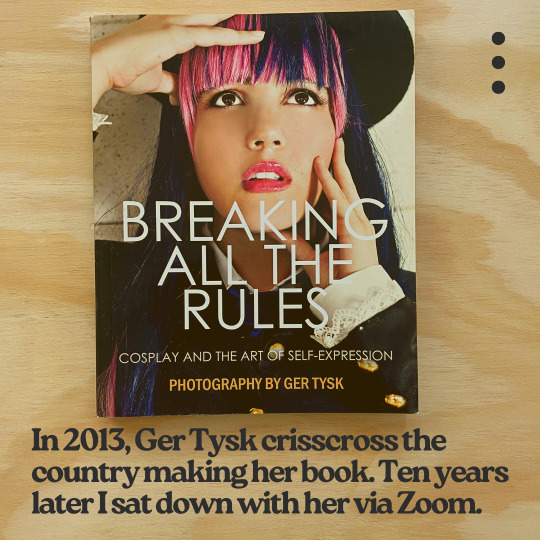
Ger Tysk’s life has taken her all over the world, as a writer, professional sailor, graphic designer, and photographer. Though she’s accomplished so many things, one particular achievement that first drew her to our attention was the release of her cosplay photography book ‘Breaking All the Rules: Cosplay and the Art of Self-Expression’ in 2013. In 2011-2013, Tysk visited 43 different states, including Hawaii and Alaska, and shot with around 120 cosplayers to showcase the diverse diaspora of the cosplay community at that time.
Now ten years later Ejen and Tysk catch up, to discuss the 10th anniversary of her book, her life since then, and her thoughts on cosplay today.
When asked if Tysk recalled what inspired her to create the book, she considered and said “I don’t think there was a moment [I can point to]. Your book Cosplay in America was out, and that was kind of the time everyone was trying to do cosplay magazines. There were a bunch of cosplay magazine startups and people were doing little photo booklets. It was like the wild west of cosplay photography because cosplay photography was just starting to become a thing. I think you were the first person that thought “Oh, cosplay photography. I can actually use this to make a book.” And then everyone else thought I want to do that. So maybe I hopped on the bandwagon, but I also wanted to travel around and meet different cosplayers.
Tysk continued, “I was really interested in what made people cosplay. Because I was in my late 20s, early 30s, so I was old, right? I was an “old” cosplayer at that point. I thought wouldn’t it be cool to talk to younger cosplayers.”
Tysk remembered the landscape was changing quickly in the cosplay community, and that made it especially fascinating to talk to cosplayers at that time.

When asked what her favorite part of the photo book was, Tysk definitely emphasized the interviews.
Tysk said, “[The stories] were the most interesting part to me. The photos were cool, but I really wanted to know the person behind the photo. I didn’t specifically go for well-known cosplayers because people knew their stories already. They were everywhere. So I wanted say a random person from Iowa, who wasn’t going to probably become a professional cosplayer, had a day job, and was just doing it. And I’d ask, “Why are you doing this?” It was really interesting.
Tysk’s goal to seek out underrepresented cosplayers across the country led her to really focus on travel as a key component of her book’s success.
Tysk noted, “I was trying to go to conventions in the middle of the country that [weren’t as popular or crowded]. Everyone goes to Anime Expo. Everyone on the east coast goes Anime Boston, Otakon, or KamiCon which have just become big. Everyone was like, “We have to go,” but I’d go to AnimeIowa.
Tysk relied on crowdfunding to help get the book published, and to cover expenses, and she learned a lot in the process that helped with future projects.
Tysk commented, “I did two [fundraising campaigns] on IndieGoGo. I learned a lot. The first one I asked for way too much money for not a lot of stuff. I didn’t articulate my vision well and what was going to happen and what people were going to get. So I didn’t meet my goal, but the good thing about IndieGoGo is that you don’t have to meet your goals to get the money. So I got that money and I did a second one where I pared down the amount, and laid out my concrete asks. I said ‘I need money to go to these particular conventions because I want to get cosplayers from these particular regions.’ That was much more successful. That led me to a second book that I did, which is nothing to do with cosplay, but was also a photo book, and I did a KickStarter for that. Because of what I had learned on these two crowdfunding campaigns for this first book, I was able to do a KickStarter that was successful.”
After her campaign’s success she began to travel to capture photos for the book. She met so many cosplayers in the community, with one meeting standing apart for her in her memory.

Since her time working on the book, Tysk herself has stepped away from the life of cosplay more and more, as she’s taken up other pursuits.
Tysk said, “I don’t know if I consider myself a cosplayer these days. Some people you talk to they’re like ‘Once you are a cosplayer you can always just come back. It doesn’t matter’. I suppose that’s true. And I don’t have any desire to quit cosplaying forever. If one of my friends really convinces me to go to a convention for a day pass I’ll do something. I mostly quit cosplaying because I started sailing full time. So I was out on a boat for like 9 months out of the year and that really kind of puts a damper on your con going, so I just couldn’t do it.”
Tysk laughs, “I did think about it, but on a lot of the boats there’s no showers and no mirrors and you know it’s not really a great place to wear costumes.”
Though she hasn’t cosplayed in sometimes, she still thinks fondly of her times at cons and in cosplay.
Tysk remarked, “Every so often someone will tag me in a flashback Friday, and they post Ger took this photo. And I was like, ‘Oh, that was a really great costume!’ And then I remember all the fun we had at that con, and how stressed out I was because I was carrying all my light stands around the convention. And I used to cosplay and do photography at the same time, which was hilarious. There was a point that someone had a photo of me once when I was in my Sakura costume from Naruto and I was doing a photo shoot of this other cosplayer and I’m down in heels with my wig and I’m trying to take a photo. It was a little ridiculous. But because I was a cosplay photographer and I was a cosplayer I didn’t want to miss out on the con just because I had booked some photo shoots.”
We return to the topic of her book’s anniversary, and Tysk remarks about how she’s not alone in her separation from cosplay and the cosplay community, as she sees some friends in her generation and many people she interviewed have themselves stopped cosplaying.
Tysk remarked, “It’s funny because you go through the interviews in the book and one of my questions was ‘Do you think you’ll be cosplaying ten years from now?’ I would say 99% of them were like of course, and most of them don’t cosplay anymore.”
Tysk has not attended an anime convention since 2015, and she has wondered since if cosplay has changed so much that it’s harder to really become a part of the scene as it once was.
Tysk said, “When I made the book, I thought ‘I don’t see why cosplayers wouldn’t cosplay 10 years from now. It’s an accessible hobby.’ Then I think about it, and is it still an accessible hobby? Because the bar is so high now. You go on Instagram or TikTok or Facebook or OnlyFans and you see all these people in their amazing costumes with professional photography. And it’s like, do I have to look like this? Do I have to wear these costumes? Do I have to be on the latest trends of the latest shows? Do I have to have an OnlyFans? Do I have to be a professional? Is the goal to be a professional cosplayer? Do I have to win awards? Because that’s what social media has been telling these kids.”
Tysk then clarified though it’s perhaps more complex, “I’m not going to say it’s good or bad. It’s just evolved. Cosplay is an art form which I still firmly believe in. Art evolves and changes and who am I to say it’s not art or it’s art or whatever. There’s just a lot more options from back then. I think it’s great because a lot of people who are trying to get into cosplay have a bigger platform to get into it. There’s also a lot more shows and games to choose from. Back then everyone was cosplaying the same eight anime that you could find because you were getting [the same few] VHS tapes. I think it’s pretty incredible that you can make a career out of cosplay. That’s awesome! If people are doing this and they’re good at it and they’re making money and they can support themselves by cosplaying, no matter whether it’s companies hiring you, having an OnlyFans, or a million subscribers, good for you. I think the Internet has been really awesome for that.
When I expressed my own uncertainty at how fandom and cosplay has evolved, Tysk said, “I agree with you. I have mixed feelings about this whole change, but I always think about Marty when I interviewed him. He said ‘A lot of people in my generation hate it when people are like ‘Oh cosplay!’, and he’d say you know it is changing and I just think it’s really awesome that younger people are getting into it.’ So I try and remember his words of wisdom because he was a really smart man.’
Now with books, websites, blogs, and social media sites everywhere all about cosplay and fandom, I wondered what Tysk thought might be remembered in the years to come?
“The Internet is like word vomit. You know everyone has something to say and everyone has an opinion. What is actually important and what are people going to remember? I don’t want to say that people who wrote those fan zines from the 60s were the only important people because maybe they were just the people who had access to a publishing studio or a printer or whatever. But in ten years when people look back on cosplay what are they going to remember? And then ten years and then ten years [after that?]”
17 notes
·
View notes
Text
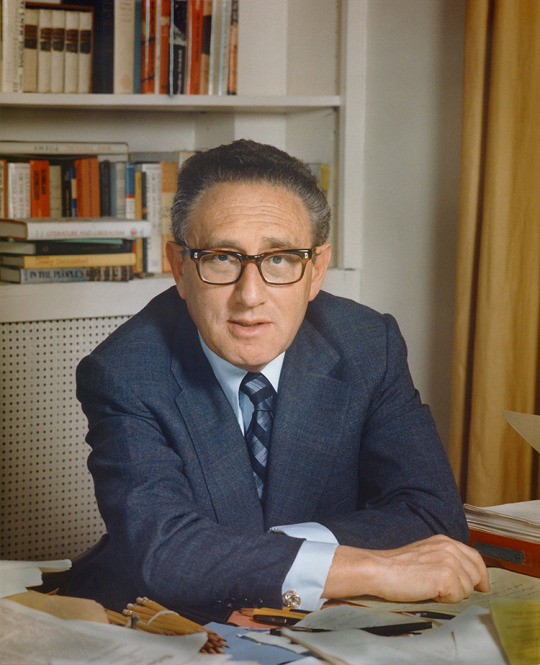
Henry Kissinger, who has died at the age of 100, was the most controversial US foreign policy practitioner of the last half-century, the architect of American detente with the Soviet Union, the orchestrator of Washington’s opening to communist China, the broker of the first peace agreement between Egypt and Israel, and the man who led the US team in the protracted talks with North Vietnam which resulted in US forces leaving Indochina after America’s longest foreign war.
Feted for these accomplishments as national security adviser and later secretary of state under Richard Nixon, Kissinger achieved global celebrity status and in 1973 was awarded the Nobel peace prize. But it later emerged via leaked documents and tapes and former officials’ memoirs that behind his diplomatic skills and tireless energy as a negotiator there lurked an inordinate love of secrecy and manipulation and a ruthless desire to protect US national and corporate interests at any price. His contempt for human rights prompted him to ask the FBI to tap his own staff’s telephones and, more seriously, to give the nod to Indonesia’s military dictator for the invasion of East Timor, to condone the actions of the apartheid regime in South Africa in invading Angola, and to use the CIA to help topple the elected government of Chile.
A formidable academic before he worked for the government, Kissinger reached greater heights of political influence than any previous immigrant to the US. His nasal German accent never left him, an eternal reminder to his adopted countrymen that he was a European by origin. To Kissinger himself, the fact that a man born outside the US, and a Jew to boot, could become its secretary of state was a never-ending source of pride.
Although Kissinger was often seen as a supreme believer in a world order based on realpolitik and a balance of power, at heart he was ultra-loyal to the individualistic American ideal. In love with his adopted country, he was infused with a missionary zeal to maintain American hegemony in a shifting world.
Heinz Alfred Kissinger was born to a comfortable, middle-class family in Fürth in Bavaria. His father, Louis, was a teacher, his mother, Paula (nee Stern), a housewife. As a boy, he was old enough to comprehend the collapse of their domestic stability when the Nazis came to power. He and his younger brother were beaten up on the way to school, and eventually expelled. His father lost his job. The family emigrated to New York in 1938.
Kissinger rarely discussed his refugee past, and once told an interviewer to reject any psychoanalytical link between his views and his childhood, but some observers argued that his personal experience of nazism led to his horror of revolutionary changes as well as to the underlying pessimism of his analysis of world affairs.
After George Washington high school in Manhattan, his accountancy course at the City College of New York was interrupted in 1943 when he was conscripted. He was with the US army in Germany for the Nazi surrender and the first months of occupation. He won a bronze star for his role in capturing Gestapo officers and saboteurs in Hanover. In 1946 he went to Harvard, where he stayed intermittently for the next quarter of a century. He received his PhD in 1954 with a study of the 19th-century European conservatives Metternich and Castlereagh, which he turned into a book entitled A World Restored: Metternich, Castlereagh and the Problems of Peace, 1812-1822 (1957).
His subsequent studies led him to become a specialist on nuclear weapons, who caught the eye of Nelson Rockefeller, the governor of New York and a bastion of east coast liberal Republicanism. Kissinger’s desire for influence on policy was already leading him to spend time in Washington, and he combined his academic work with consultancies for various government departments and agencies, including the Joint Chiefs of Staff and the National Security Council under Dwight Eisenhower.
Kissinger’s patron, Rockefeller, failed to make much headway in the presidential campaigns of 1960 and 1964, but after Nixon won the presidency for the Republicans in 1968, Kissinger was appointed national security adviser, with an office in the White House. His intellectual drive, as well as geographical closeness to the president, allowed him to turn what had previously been a backroom job into a high-profile, decision-making post.
Kissinger knew that access is power, and that the relationship goes both ways. Having the ear of the president gave him the ear of a competitive, news-hungry Washington press corps which admired his charm and brilliance and eagerly printed a generous amount of his on-the-record comments while finding ways to divulge unattributably the confidential titbits and insider gossip that he loved to drop.
A battle developed between Kissinger and the secretary of state, William Rogers, the nominal architect of US foreign policy, during Nixon’s first term. Kissinger won it easily. Rogers was excluded not only from the administration’s central concerns – Vietnam, the Soviet Union and China – but even the Middle East, the one area where he achieved some praise in 1970 with the so-called Rogers plan. The plan was a US effort to impose a settlement between Egypt and Israel with the backing of the Soviet Union. Israel rejected it while Kissinger felt that the goal of US policy in the region, as indeed throughout the developing world, should be to reduce the Kremlin’s influence rather than give Moscow equal status.
When Rogers eventually resigned a few months after the start of Nixon’s second term, Kissinger got the job he coveted most. Four years of private advice and back-channel negotiating were to be crowned by formal acceptance as Washington’s senior international representative and America’s major speechmaker on foreign affairs. Kissinger had already scored the two biggest coups of his career, proving that he was more than just an academic consultant and bureaucratic in-fighter, but a cunning negotiator. He ran the secret diplomacy which culminated in July 1971 with the stunning announcement that Nixon was to go to China to meet Mao Zedong the following year. He also led the negotiations in Paris with Hanoi for the peace treaty that sealed the departure of American troops from Vietnam. For the second of these feats, he shared the Nobel peace prize with Le Duc Tho, the North Vietnamese negotiator, though the latter refused to accept it.
The award aroused a huge controversy since it coincided with revelations that Kissinger had supported Nixon’s decisions to mount a secret campaign of bombing Cambodia in 1969. Cambodia had long been used by North Vietnamese troops for bases and supply depots, but Nixon’s predecessor, Lyndon Johnson, resisted pleas from the joint chiefs of staff to bomb them. The country was officially neutral and its leader, Prince Norodom Sihanouk, was desperately trying not to take sides.
But the Nixon administration wanted to send a strong message to North Vietnam that the new president would be tougher than Johnson. Tapes of White House conversations (the Watergate tapes) revealed that Nixon called it the “madman theory” – “I want the North Vietnamese to believe that I’ve reached the point where I might do anything to stop the war,” he told his chief of staff, Bob Haldeman. Kissinger endorsed the concept, though he preferred to put it in more academic language by arguing that US policy must always retain an element of unpredictability.
In March 1969 Nixon and Kissinger ignored the reluctance of Rogers and launched waves of B52s on carpet-bombing missions over Cambodia, as they had already done in Vietnam. The raids went on for 14 months, although officially the administration pretended the targets were all in South Vietnam. Initially, Kissinger did not even want the pilots to know they were striking Cambodia, but he was advised that they would soon find out and be more likely to leak the information unless sworn to secrecy ahead of the raids.
The bombing remained secret in Washington for an astonishing four years, becoming public only when a military whistleblower wrote to Senator William Proxmire, a prominent critic of the Vietnam war, and urged him to investigate. In Cambodia the campaign led to an estimated 700,000 deaths as well as 2 million people being forced to flee their homes. It also led a pro-US army general, Lon Nol, to seize power from Sihanouk in 1970 and align the country with the US. The bombing and the coup fuelled popular unrest, added to the strength of Cambodia’s communist guerrillas, the Khmer Rouge, and paved their way to power in 1975.
The Paris peace talks on Vietnam also coincided with an escalation of US bombing in Vietnam itself. At the height of the negotiations at the end of 1972, Nixon and Kissinger took the war to new heights with the “Christmas bombing” campaign, comprising targets across North Vietnam. It enraged the US peace movement and provoked a huge wave of new protests and draft-card burning by conscripts. Kissinger’s aim was not so much to intimidate Hanoi as to persuade Washington’s ally, South Vietnam’s president Nguyen Van Thieu, to accept the accords which the US was making with the North. The bombing was meant to assure him that if there were any North Vietnamese violations after the accords came into effect, they would be met with all-out American force.
Kissinger was aware that the Paris deal was flawed, and might well lead to Thieu’s replacement by a communist government. His goal was merely to win a “decent interval” between the pull-out of US troops and the inevitable collapse of the regime in Saigon so that the US could escape any perception of defeat. The phrase “decent interval” appeared in the briefing papers for Kissinger’s secret trip to Beijing in 1971 that were later declassified. They show he told the Chinese that this was US strategy in Vietnam. A year later he informed China’s prime minister, Zhou Enlai: “If we can live with a communist government in China, we ought to be able to accept it in Indochina.”
When the North Vietnamese army and its southern allies, the Vietcong, stormed into Saigon in April 1975, forcing the US ambassador into a humiliating helicopter escape, the image was clearly one of defeat, in spite of the two-year interval since the departure of most US troops. But Kissinger blamed Congress, claiming it had undermined the peace deal by refusing to finance new arms shipments to Thieu. This was a favourite refrain. He continually attacked Congress for interfering in foreign policy, apparently never recognising the value of democratic checks on strong executive power.
Turning his skills to the Middle East, Kissinger gave birth to the concept of shuttle diplomacy, a term first used to the press by his close aide Joe Sisco. He flew between Jerusalem and Cairo during the October 1973 war to hammer out a ceasefire after the Israelis had sent their troops across the Suez canal and come close to the Egyptian capital. He later secured Israel’s withdrawal back across the canal, and shuttled to and from Damascus to make a deal with Syria for the Israelis to withdraw from a small part of the Golan Heights.
Behind all three issues lay the Americans’ competition with the Soviet Union, then at the height of its international power. The US opening to China was designed to wrong-foot the Russians by turning what they thought was an evolving, bilateral relationship of parity and mutual respect with Washington into an unnerving triangle which seemed to ally China and the US against them. Kissinger hoped to exploit the two communist powers’ rivalry to persuade both of them to abandon the Vietnamese, thus making it easier for the US to win the peace, if not the war. So he threatened Moscow and Peking (now Beijing) with the argument that they would lose the benefits of dialogue and trade with Washington if they did not stop their arms supplies to Hanoi.
In the Middle East, Kissinger’s aim was to exclude the Russians, who had been longtime allies of Egypt and Syria. By extracting concessions from Israel and brokering a ceasefire in the 1973 war, Kissinger persuaded Cairo and Damascus that only the US could achieve movement from the Israelis, thanks to its unique influence. A year before the war, Anwar Sadat, the Egyptian president, had shown his distrust of Moscow by asking thousands of Russian advisers to leave Egypt. The move was meant as a signal to Washington that Egypt preferred good relations with the US, provided Washington put pressure on Israel. Kissinger missed the signal and did nothing until Sadat, in desperation, launched his attack on Israel in October 1973.
Kissinger’s strategy of detente with the Soviet Union was also designed to reduce Moscow’s room for manoeuvre. Although rightwing Republicans criticised it as appeasement, he argued that Washington should not just contain the Soviet Union, as previous American administrations had sought to do. The US should tame it by giving it a stake in the status quo. Instead of going for ad hoc deals with the Kremlin, Kissinger was the first senior American to try to establish a complex of agreements with a range of penalties and rewards for bad and good behaviour. This, he argued, would limit Soviet adventurism. Sometimes he called it a network, at other times a web, but in both cases the aim was to provide the Soviet Union with benefits from expanded trade, investment and political consultation with Washington.
The strategy failed to produce a new world order because Kissinger was not willing to abandon adventurism on the American side. In the developing world, in particular, Kissinger pursued policies of confrontation with Moscow, often based on faulty analysis of what the Russians were doing or exaggerated claims of the extent of their influence. The successful US effort to overthrow the elected president of Chile, Salvador Allende, in 1973 fitted into the long US history of intervening in Latin America against leftwing governments that nationalised US corporations (in this case, the big copper companies). But Kissinger also disliked Allende’s closeness to Moscow’s ally, Cuba. “I don’t see why we need to stand by and watch a country go communist due to the irresponsibility of its people,” he commented.
By 1974 Kissinger’s boss was being engulfed by the Watergate scandal. Although Kissinger was involved in secretly taping his own staff, he was not connected to Nixon’s decision to burgle the headquarters of the Democratic party at the Watergate apartment complex in 1972 and then cover up the truth – the charges that brought the president down. In spite of the scandal – or perhaps because of it – Nixon’s relationship with Kissinger remained close, in large part because the beleaguered president saw Kissinger as his best ally in foreign policy, the area where Nixon felt that he had been most successful. He wanted Kissinger to be the man to preserve his legacy.
In his memoirs, Kissinger described how Nixon virtually clung to him during his last hours in the White House in August 1974. The disgraced president asked him to pray beside him in the Lincoln bedroom for half an hour. “Nixon’s recollection is that he invited me to kneel with him and that I did so. My own recollection is less clear on whether I actually knelt. It is a trivial distinction. In whatever posture, I was filled with a deep sense of awe,” Kissinger wrote.
Although Kissinger was not charged over Watergate, his image nonetheless became tarnished. Damaged by revelations of the secret bombing of Cambodia, the favourable media bubble burst. Kissinger’s path from miracle worker to being perceived as a cynical trickster proved short. If Nixon was a serial liar on the domestic stage, Kissinger was seen as a similar villain on the international one. Nevertheless the next president, Gerald Ford, who had limited foreign experience, kept Kissinger on as secretary of state as a symbol of continuity. But Kissinger’s star was in decline. He tried to change his focus by shifting his attention to Africa, which he had ignored until then.
His results were far from positive. He may well have set back the fall of apartheid by several years by approving the involvement of the CIA in the Angolan civil war and giving the nod to South Africa’s invasion in 1975 as the Portuguese withdrew from their erstwhile colony and granted it independence. The South African intervention prompted Cuba to send hundreds of troops to support the Angolan government, thereby launching one of the bloodiest “proxy wars” between the superpowers.
When the Republicans lost the White House to the Democrats under Jimmy Carter in 1976, Kissinger’s time was up. He spent the next decades as a consultant to multinational corporations, and speaking on the international lecture circuit. In 1982 he founded his own firm, Kissinger Associates.
Although he had brief hopes of a comeback when Ronald Reagan won the 1980 election, the new president and his men did not feel comfortable with Kissinger’s image or the strength of his personality. His public persona of pragmatism did not fit their crusading ideology of anti-communism and their constant claims of Soviet expansionism. They were from the school which felt his contacts with the Soviet leader, Leonid Brezhnev, during the period of detente, had smacked of appeasement.
The charge was absurd. It reflected the difference between subtlety and simplicity, as I discovered at one of the occasional deep-background “non-lunches” which Kissinger gave for representatives of European newspapers. Europe was never a high priority for Kissinger, in large part because it was not a region of US-Soviet competition. He favoured a strong and united western Europe so as to keep Germany in check, hence his much-quoted comment: “If I want to call Europe, who do I call?”
But he seemed to like meeting European correspondents, flattering us with the sense that we asked deeper questions than our American colleagues. At one such lunch, I was staggered by Kissinger’s emotional outburst when someone delicately raised the appeasement charge that rightwing senators were making. “Do you really think a man who stopped Allende wouldn’t want to stop Brezhnev?” he retorted.
If ever there was an American super-patriot, it was Kissinger. As a European intellectual, he knew better than his adopted compatriots how to run an empire. The bedrock of his policies was fear of a resurgent, “unanchored” Germany, a firm desire to keep western Europe closely tied to the US, and a fierce determination to outwit the Soviet Union and maintain American dominance, if necessary through the use of military might. It was no surprise that in his 80s, long after the Soviet Union had collapsed, he became a close consultant of George W Bush, supporting his invasion of Iraq.
Kissinger’s private life was a tempestuous subject in the Washington gossip columns, at least in the interval between his two marriages, which happened to coincide with his years at the apex of power. His first, to Ann Fleischer, with whom he had two children, Elizabeth and David, ended in divorce in 1964. Ten years later, he married Nancy Maginnes, one of his former researchers. She and his children survive him.
🔔 Henry Alfred Kissinger, statesman, born 27 May 1923; died 29 November 2023.
Daily inspiration. Discover more photos at Just for Books…?
14 notes
·
View notes
Text
I recently made the claim that the phrase "the West" was incredibly overloaded, and some people were skeptical. In an effort to demonstrate this, and also just because I enjoy list-making as an activity, here is a list of East/West dichotomies that are or have been prominent in various discourses:
"The West" as the Western Roman Empire, "the East" as the Eastern Roman Empire. This is, as far as I can tell, the chronologically original sense of the dichotomy.
"The West" and "the East" as the Latin West and the Greek East in medieval Europe, entrenched by the East-West Schism between the Catholic Church and the Eastern Orthodox Church. This is essentially a continuation of the former usage.
"The West" as Europe and its American colonies, "the East" as Asia. In this sense synonymous with "the Occident" and "the Orient", respectively. This dichotomy in itself is ambiguous, with "the Orient" principally referring to the Middle East and India or principally referring to East Asia depending on time and place.
Related to the above, "the West" as Europe and its colonial outposts, vs. everybody else (usually not called "the East" in this usage).
"The West" as the American frontier, "back East" as the US East coast. Cowboys, man.
"The West" as the Western bloc, i.e. the liberal world, and "the East" as the Eastern bloc, i.e. the socialist world.
"The West" as rich countries in general, vs. everybody else.
The ambiguity is increased by the fact that each of these terms can either A.) be purely geographical, or B.) denote a broader cultural traditional which is assumed to characterize the given region.
I've mentioned before that I am extremely dubious of the idea that there is some kind of unified "Western culture" which includes everybody from the Ancient Greeks up through the modern US, but people's usage of "the West" tends to take the existence of such a culture as presupposition.
Anyway, the point is that if you say "the West", you may or may not be including historical Greece (1-2 vs. 3-7), may or may not be including Japan and Korea (1-5 vs. 6-7), may or may not be including Eastern Europe (3-4 vs. 1, 2, 5, 6, and maybe 7, depending on time period and worldview), and may or may not be including anywhere in Latin America (4? vs. others), and may or may not be talking about cowboys (just for fun). You also may be speaking purely geographically, or using the term "Western" as synonymous with democratic and/or capitalist (6), Catholic (2), having "Enlightenment values" (3, 4), being evil (4), being rich (7), or, you know, wild cowboy ruggedness (5).
And my point is, no matter your political persuasion... do you really want all this baggage in your terminology? Do you really want to outsource your categorization scheme, your thinking, to 2000 years of telephone? I don't. That's why I don't like this term. Thankfully "the East" has mostly dropped out of usage in all the senses above—and indeed, it was always the worse of the two terms—but "the West" sadly sticks around.
Yes, I know there is no better term in many cases. There is, in particular, no word for "the set of regions including Europe and those former and current European colonies whose populations are in the majority of European descent". It would be good to have a word for this. But we don't. And thus we should come up with one.
However, we do have unambiguous terms for many of the other characteristics on this list. We have for instance:
Latin Christian and (Eastern) Orthodox Christian,
Europe, North America, South America, and Asia, and Africa. Also Western Europe, Eastern Europe, East Asia, South Asia, the Middle East, and others,
Colonial, as an adjective, as in "colonial states",
the Western bloc, the Eastern bloc, also individual adjectives like democratic, liberal, socialist, etc.
rich economies and poor economies, also adjectives like industrialized, agrarian, technicalized, etc.
And as far as I'm concerned, we should toss out the notion of "Western culture" as a coherent entity all together, because I really don't think such a thing can be shown to exist. Or rather, insofar as you believe it's a coherent entity, you have to demonstrate that. I am rather tired of the onus being placed on people who are skeptical of this notion to demonstrate that it is (at best) very slippery, rather than being placed on the people who invoke this notion to justify that it is sensible and useful.
In summary: say what you mean! Don't use polysemous terminology to package together many qualities which you have not justified as principally or necessarily co-occurring!
127 notes
·
View notes